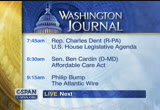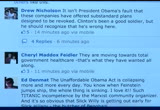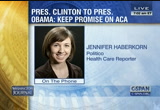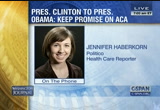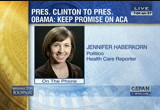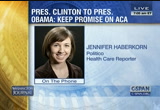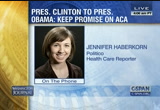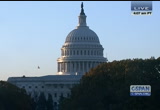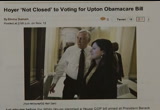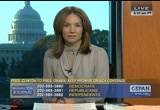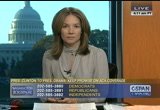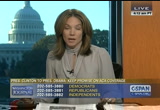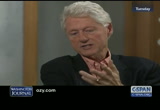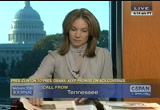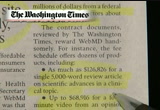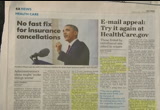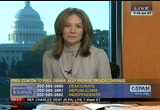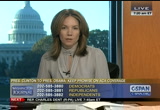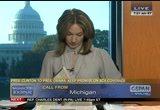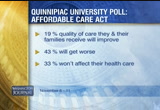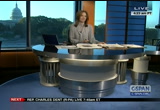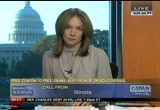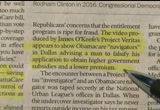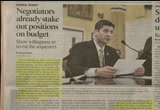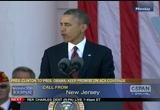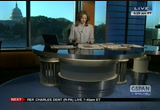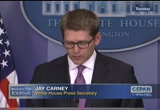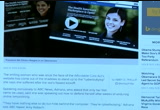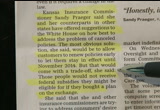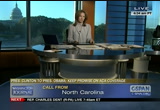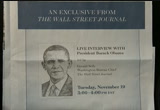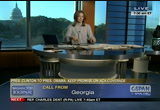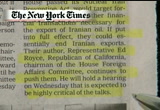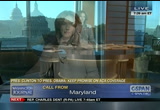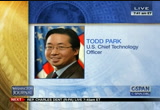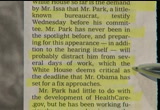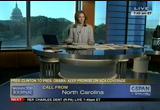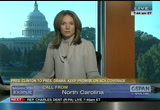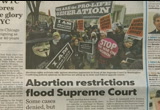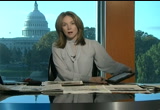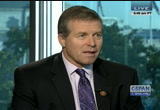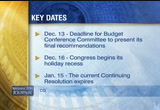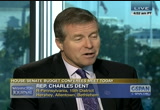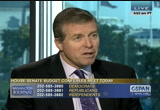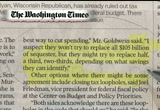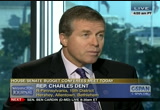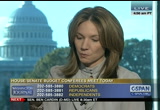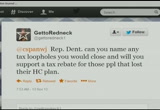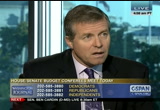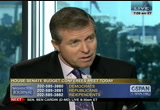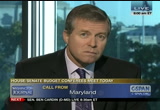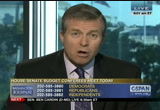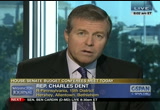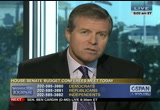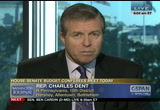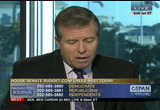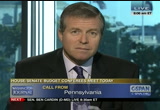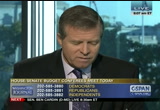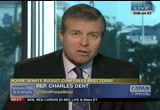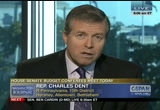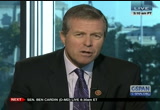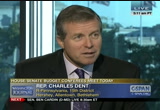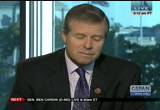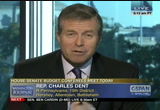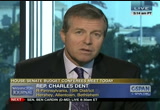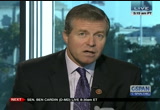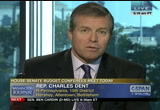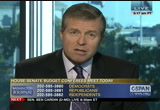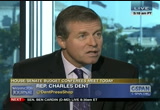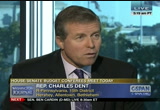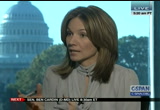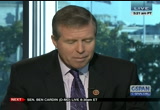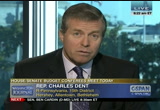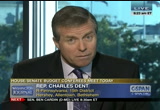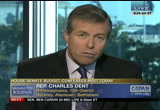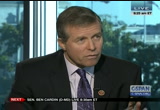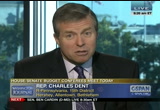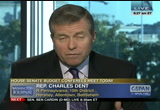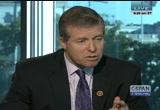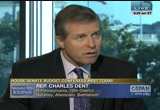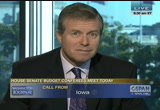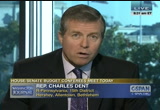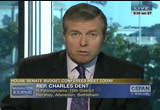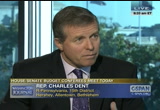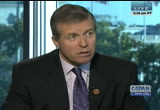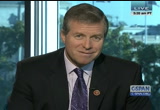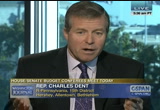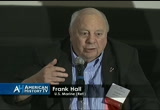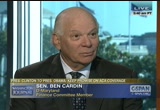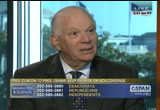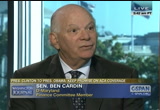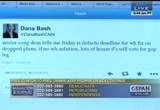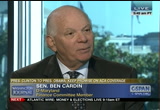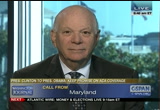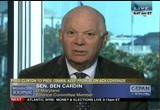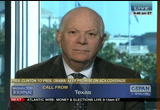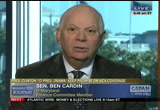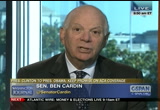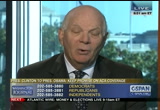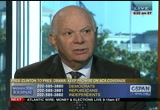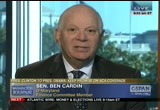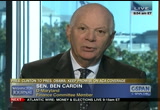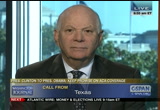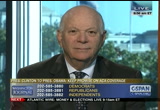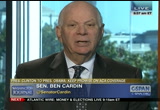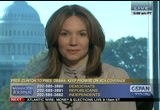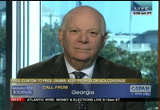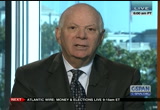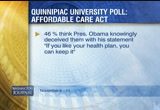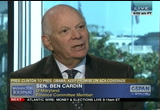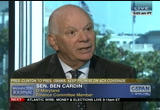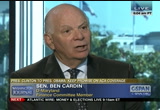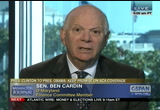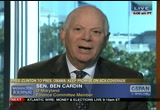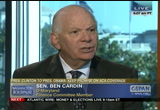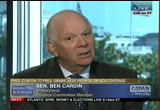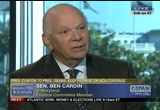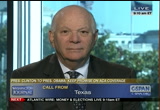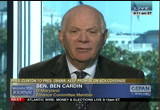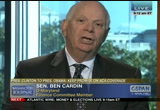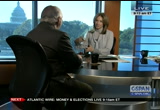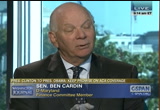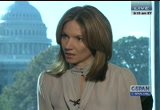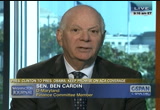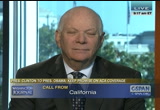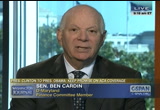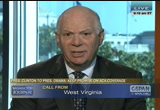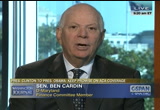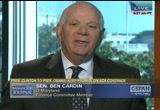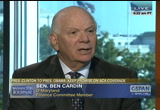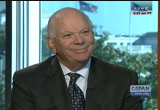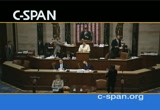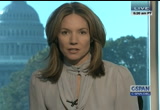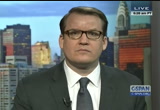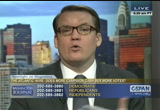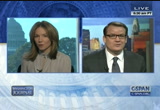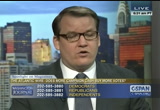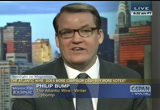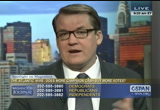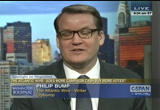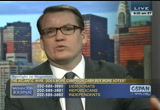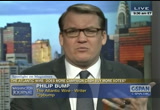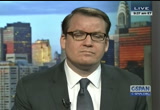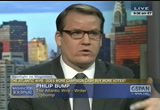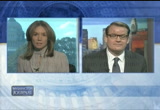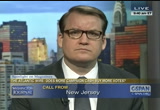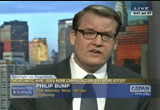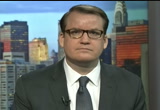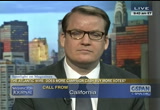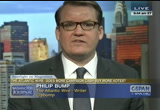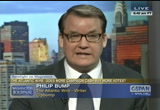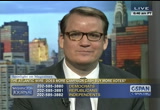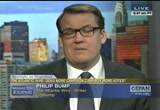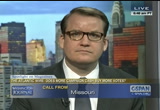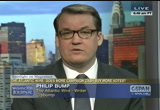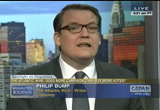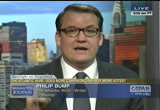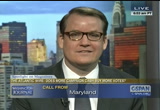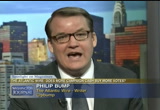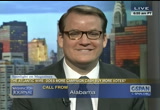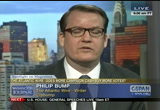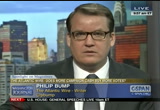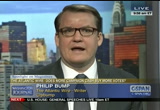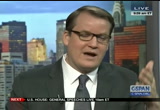tv Washington Journal CSPAN November 13, 2013 7:00am-10:01am EST
7:00 am
we will also look at today's news and take your calls, e- ♪ails, and we -- good morning, everyone on its wednesday, november 13, 2013. we will begin the "washington journal" this morning talking about the health-care law. president obama -- president clinton says prez obama, honor your pledge and let people keep your insurance even if it means changing the law. the housebroken are readying a bill to do just that on the house floor this week. the house oversight government reform committee kicked off today a series of hearings looking at the rollout of the affordable care act. our coverage on www.c-span.org 9:30 this morning. meanwhile, house and senate conferees meet this morning to hash out a covert seal on c-
7:01 am
span3 -- out a coverage deal on c-span3. democrats, dial (202) 585-3880, republicans (202) 585-3881, and independents, all others (202) 585-3882. also, send us a tweet @cspanwj, or jointly cumbers comers asian on facebook.com/c-span, -- or join the conversation on facebook.com/c-span. it isn'tolson says -- president obama's fault that these companies have offered substandard plants designed to be revoked. clinton has been a good social club -- soldier, but he should recognize that he is wrong here. sheryl says they are moving toward total government health care -- that is what they have wanted all along. says the on affordable
7:02 am
obama act is collapsing more and more everyday. you know when feinstein jumps ship, the holding is thinking. i love it. deb says -- paving the way for hillary, goes with whatever that centers at the time. we want to get your thoughts this morning. what do you make a president clinton saying to president obama you need to keep your promise on people's insurance coverage? while we wait for your phone calls to come in, jennifer haberkorn is politico's health- care reporter. she is on the phone. with president clinton making its comments to an online magazine. what you make of it? what does this do to the houseboat this week for the republican's keep your plan act? guest: the white house certainly did not appreciate, i am sure, president clinton saying his comments yesterday. i mean, this is the white house -- he is the guy who was supposed to make health care more accessible, and understandable to the public,
7:03 am
and now he says president obama needs to consider changing a piece of it. republicans are already jumping on this and saying president clinton has jumped ship on obamacare. it is just going to further the republicans' talking point when they discuss on the house floor this week. host: the white house said yesterday we agree with president clinton, but what can they do to help out those people that have lost their current plan? guest: the reality is there's not much they can do at this point without dramatically changing the law. the white house could allow thate to stay on plans existed in 2013, but the insurers that i spoke with said it would be very hard and practicality to resurrect this plan that has already been canceled. insurers have started to break down plant that do not comply with the aca, and to bring those back at this point would be
7:04 am
pretty difficult. if the white house were to come out with an or the optionr bill that is being considered this week that would allow insurers the option of keeping their lands in existence, it sounds like and practicality that would have little effect. host: is that is what the health legislation would do? explain what that bill says? would give the option of keeping the plan in 2013 that they had been selling in 2013 -- and 2014 that they had been selling in 2013. it would be entirely up to insurers whether they would want to keep that plan, and in the customer would have that option. if they were to stay on a plan, they would not be eligible for the tax subsidies in the affordable care act that are going to be available to customers and 2014. legislation in the senate per acre to senator dianne feinstein, as one of our
7:05 am
reviewers commented on facebook, has legislation. what would that legislation do? guest: that is similar but it would require insurers to keep plans that were active in 2013 into 2014. insurers are a bit more worried because they feel like -- they don't want the federal government ordering them to keep plans in existence. the landrieu bill would require is selling a plan in 2013 to heat the plan available to existing customers as long as the insurer has not gone out of business entirely in individual market. host: was senate majority leader harry reid let that come to the floor? guest: at this point, there is no reason to think that. the majority leader has every interest in strengthening the affordable care act, and for this to come to the floor, i could just see the republican voting for it as well as
7:06 am
democrats such as senator landrieu. already senator hagan and senator mansion from west virginia has signed on. manchin from west virginia has signed on. host: are democrats excited to go for that? many --e are expecting i should not say many, at least as many that voted for repeal the individual mandate. to 40 democrats. one thing to watch out for is what the white house comes out with, an administrative fix. fix for looking for a the healthy folks that have lost their coverage but are not have subsidies. the white house were to come out with an option before the house vote, that would give democrats a way of saying they are trying to address the problem without voting for the upton bill. host: what is the vote expected in the house? guest: friday, right before congress leaves town for the
7:07 am
week. host: the house oversight and government reform committee also kicks off a series of hearings today looking at the rollout of the affordable care act. what is expected to happen at today's hearing? guest: this is expected to be a pretty intense hearing. chairman issa has subpoenaed todd park, the chief technology officer and one of the masterminds behind healthcare.gov. the administration said initially that part would be available to testify this week and that his testimony should be postponed until early december so that he could continue working on healthcare.gov. that is nota said acceptable and issued a subpoena. park is expected to come to the hill and testified. also, henry chow, one of the people that was named an earlier hearings on capitol hill as one of the big decision-makers on healthcare.gov.
7:08 am
he will be there as well. i spent most of the focus to be on those two. host: all right, jennifer have recorded -- jennifer haberkorn with politico, thank you so much. guest: thank you, greta. host: whether or not democrats vote in his house legislation depends on what the white house announces, if there is an administrative fix. this tweet -- senior congressional democrats tell me friday is a de facto deadline for white house fix on dropped plans. if no white house solution, lots of white -- lots of house d's will vote for gop legislation. reported this yesterday -- the number two for house democrats, steny hoyer, not closed to voting for upton obamacare. just minutes before the white house landing house gop bill aimed at residents rock obama's
7:09 am
-- at president barack obama's if you like it you can keep his statement, he was open to propose changes to the affordable care act. now we turn to all of you. would you make of president bill clinton's comments yesterday in an interview saying that the president should keep his promise? mark, a republican, south carolina, hi. caller: how are you all this morning? andnybody falls for this trade here, in other words, we're just going to try to hold electionshalf of the in 2014. you have 12 democrats up for --ction, and all 12 of them they are all going to say oak am a this is such a bad thing because they are up for reelection. oh, this is a tibet
7:10 am
thing because they are up for reelection. they are only going to try to do something until 2013. after that, things will be back to normal. mirrorsjust smoke and by the president and they're trying to get billy boy to come out and help them. that is all it is. it is ridiculous. that the house and the senate are going to work together -- isn't that something? democratsicans, the are finally going to work with a against. that is just amazing that -- it is such a good idea. believe or not -- morons. mark.all right, dan is next. caller: jimmy carter was right about one thing. he said that our whole political system is broken. absolutely broken. when you look at the republicans about keeping their word, look, george bush promised us there were weapons of mass destruction
7:11 am
against iraq, and we went there and there were not. and we got all those guys killed. you think there should be a ruckus about that? no. ,here is a ruckus about obama he is trying to give everybody health care, and because it is not working exactly like they know, and setu these republican congressman saying we're are going to give the president can't, every move president a -- the hand, every move they throw a monkeywrench. just like jimmy carter said, our political system is broken and the main reason is because you have a bunch of spoiled brats in congress who were willing to chop a hole in the bottom of the boat of america because they cannot get what they want. they want all of us to drown. you know what, that is socio- patent behavior. do whatever it is you got to do to get whatever it is he wants, and disregard everybody else. what is the matter with these people you go -- people?
7:12 am
host: what do you make about clinton and the comment you made yesterday? linton was wrong. the democrats need thick skin. obama is doing something -- he is going to go down as one of the greatest presidents in america after all this crap blows over. he wants to give the american people health care. and what are the republicans doing? they are throwing a monkeywrench in at every step. not care about the american people -- they care about corporations who give them the big money to get reelected. that is what this is all about -- it is about money. right, dan, we will be talking about a specific way on "washington journal" in our last hour about campaign cash, whether more campaign cash buys you more votes as part of our spotlight on magazines series. let's listen to what the former president had to say in his own words when he sat down with a web magazine for an interview yesterday. [video clip]
7:13 am
>> for young people, mostly, but not all young who are in the individual market who are above four percent of the poverty level, they are the ones who are the promise if you like what you got, you can keep it. another young man this week who has a family, two children, but in the individual marketplace, his policy was canceled, and one was substituted for it that doubled his premium. coverage,m the same he said yeah, and i said but are your co-pays and adoptable the -- and deductibles the same? and he said no, much lower. he said in the years i use, what i might actually save money, but we are all young and healthy, so i personally believe it would take a change in the law. the president should honor the commitment the federal government made those people. host: that was president clinton sat down to interview with a web
7:14 am
magazine. by the way, the music that came in at the end was put in there by the website. , couple of tweets here for you steve harrison says first, president clinton is correct, second, it will not affect the 2014 or 2016 elections as some have speculated. boaters forget. forget. this -- voters there is this tweet from edwin -- i agree, he should also find the entrance cubbies for canceling the insurance policies. john from tennessee, independent, what do you think? caller: what the president promises one thing, but people have a tendency to promise something and it can't follow through because of a small, little, fine print. my comment is more about the affordable care act and why they are not going after the manufacturers that make medical and charge 100 times
7:15 am
more than the costs to make them to the hospitals and the patients. if i did something like that, i would be arrested for price gouging. why are we not going after these manufacturers for the same thing , and by bringing the price down of these devices and medication, one at that lower the cost of insurance and the cost of medical care in the country? that is all i have to say. thank you. host: john, the affordable care act did include a tax on medical device manufacturers. do you think that was the wrong way to go? caller: yes, i do, because a tax, all they do is raise the price of their products to cover the tax. for example, there was a hip implant that cost 350 dollars to make, yet it cost $15,000 for the hospital to buy. that is a huge increase in
7:16 am
price. i think that is wrong on the part of the manufacturer to put it to the people like that. host: all right. and other health care news, front page of the "washington times" has the headline that the web and the website has a healthy deal with obamacare. the consumer site spoke kindly about the law and in return got millions under the law. the web in the received -- webmd -- which millions of americans read for health news, stood to earn millions of dollars from federal contracts to teach doctors about obamacare.
7:17 am
host: and then the "new york times" has a lengthy piece in their paper this morning about state insurance exchanges, and they are having technical problems as well. the article says this held thatly the data checks -- hub that checks host: so more on the health-care exchanges on the stateside as well. no fast"usa today" -- fix for insurance cancellations.
7:18 am
7:19 am
earlier. but anyways, i blame the press -- basically letting nancy pelosi pass a law without anybody getting to look at it. we don't really have a health- care law -- we have a tax law. that is what it is. truth, i did not mind going bankrupt over health care, but you cannot go bankrupt with the irs. that if the problem with them, you know. and if somebody wants to give me some the, actually, i have to wanted first. it is not a gift if you do not want it. i mean, i do not want to drink poison, but people are handing out poison. what is going on? maryland,right, val, democratic caller. caller: good morning, suzanne. first-time caller. -- good morning, c-span. it amazes me when when people call saying ok, -- i do not mind
7:20 am
filing bankruptcy for medical reasons -- well, who pays for the bankruptcy once he writes off all of his bad debt? and the other part is, i wish that c-span would ask people whether or not they have medicaid, medicare, whether or not -- or if they don't have insurance at all. everybody gets sick or everybody has an accident one way or the other. who pays that? one last comment, when i went to the hospital -- i am sorry, you are breaking up, i have got to let you go. but we are doing here on the "washington journal" a partnership with kaiser health news taking a look at the affordable care act, and we have divided our lines just that way, over the time of our partnership, whether you are insured or not insured to talk
7:21 am
about the affordable care act. rufus and adrian, michigan, independent caller. caller: hi, how are you? host: good morning. caller: thank you for the opportunity to speak about the affordable care act and president clinton's comments. i agree with president clinton regarding changes that need to be made to the affordable health care. the reason i agree with him is aat what has happened is that legislation was passed, which is the aca, and was made uniform when wehe united states have each individual state with its own insurance structure. we really do not have a medical delivery system. what we have is an insurance delivery system that ensures medical care. uniformly trying
7:22 am
to change things across the u.s. , it creates a lot of hardship. i know people need insurance coverage, and that is a pluggable, but to unilaterally pplaudable, but to unilaterally put a law in effect without considering what the impact would be for each state and each citizen is problematic. all right, rufus. according to a new poll, president obama has taken a hit over the affordable care act. 39%.pproval rating now at 54% of those surveyed say they disapprove of the job president obama is doing. when it comes to the affordable care act -- take a look at the numbers. 19% of those surveyed say the quality of care they and their families receive will improve, 40% say it will get worse, and 33% say it will not have an
7:23 am
effect on their health care. 46% say that president obama knowingly deceive them with her statement that if you like your plan you can keep it. president obama taking a hit over the affordable care act with honesty and trustworthiness. but congress not doing much better. here is a new gallup poll that shows the approval rating sinks to a record low of just 9% heard a 2013 average now at 14%. congress, approval of 90%. christine, -- 9%. christine in pittsburgh, you are on the air. one must call. ok, let you move on. rosetta, democratic caller. hi, you are on the air. caller: good morning. i am a first-time caller, and i am from danville, illinois.
7:24 am
i certainly disagree with president clinton. he has sided with the president for a long time, and what he did yesterday is him a you know, not even common sense. he needs to help them fight for this aca coverage. i disagree with him. host: why do you think he did it, rosetta? caller: i have no idea. it just does not make any sense. host: doesn't help -- caller: the people really need this aca. the reason why i think that the president is on the right track, the insurance companies have built up a lot of junk insurance, in a lot of years they cut off, they get rid of insurance and bring back others. the president is trying to make this better for the people. host: all right. on president clinton's
7:25 am
motivation, the "washington times" writes this -- host: by the way, james o'keefe who we have had on this show did obamacaregation of navigators and put out a video showing navigators and dallas advising a man to falsify his application to obtain higher government subsidies and a lower premium. you can find those on project meriveritas' website.
7:26 am
many are concerned about the risk of identity theft with the affordable care act. times" report it is the department of homeland security that has the responsibility for securing the website and all other .gov domains -- host: jeh johnson is up for confirmation this week. that could come up as well as the senate debates have confirmation. also, the first hearing for janet yellen to become the next federal reserve chairman happens this week. she will be up on capitol hill tomorrow, and a couple of pieces in the paper talking about her testimony, the "financial times" ghs in saying the federal nominee must avoid surprises on tapering.
7:27 am
host: and in the "new york times ," their headline on her testimony -- host: also today, as we told you at the top, conferees for a budget deal will be meeting led by house budget chairman paul ryan and senate budget chairwoman patty murray. the "washington times" says negotiators are already staking out positions. we will talk with charlie dent, a republican of pennsylvania coming up you're on the "washington journal" about what he would like to see in some sort of deal. back to our question to all of thoughtsing your
7:28 am
this morning, what president clinton had to say in an interview saying the president should keep his promise and americans who like their health plans should be able to keep it. ron in eddington, new jersey, independent caller. good morning. caller: good morning. i do see the problem, you know, people getting insurance canceled his back, but when you look at what president obama is trying to do -- he is trying to help people. he is not trying to send people to a war that should not be fought, he is trying to get people insurance. yes, there will be kinks and bugs to work out, but at the end of the day, he is trying to help people. i do not see why people cannot see appeared republicans are not really offering anything. they are not offering anything. the democrats are the ones trying to put things out. and help people. people should just be patient and let him -- let everybody work the kinks out there and we can send people to the moon, i think we can master this health care issue and get this fixed. i just not see why people cannot be patient and let this thing
7:29 am
does happen, rollout, and of course it is going to have bugs. democrats are going to fix appeared they're not going to let things just stay the way they are. host: what about taking beholding off-line and fixing it? taking as much time as you want. caller: i do not understand why it was not ready. they should've had it ready, i agree with that. it should've been delayed until it was ready. i hate to say it was probably political, and obama should have known that they would come after obamacare so they should a major this was seamless. but it did not happen. they should make it work, taken off-line, fix it, but do not stop the law. supposed to help people, pseudo- not stop it. just fixed the problem and let it work itself out. that is the same thing that happened with medicare part d. is thea hard rollout, it same as what is happening now. anything that big is going to have things in it. we can do a lot of things but we can send people into space, we can master this health care. i wish people would be patient
7:30 am
and wait and let things happen. he is trying to help people. republicans are not trying to help. responded,hite house jay carney in his daily briefing, on what president clinton had to say and the judgment -- the different options the white house is laying. [video clip] >> the president has asked his team with looking at a range of options, as he said, to make sure that nobody is put in a position where their plans have been canceled and they cannot afford a better plan, even though they would like to have a better plan. you heard the president address his very issue in interview last week, and i think it is important to note that president clinton in that interview also said "the big lesson is that we are better off with this law than without it," and he said "the enrollment period did not come off well because the national what's i was not ready," but this happened once before, when president bush put in the medicare drug program for
7:31 am
seniors. it was a disaster. there were people who lost their prescriptive or their existing medicine, and a thick security president, as you know, has pledged to ask is team to look at potential actions to address this problem because his focus is on making sure people get quality and affordable health insurance. host: the white house yesterday responding to what president clinton had to say. by the way, there is a story that came out on abc's website that the mystery woman on healthcare.gov has been found. her face no longer appears on the website, as many of you know. abc reporting that the smiling woman who was once the face of the affordable care act website has come out of the shadows to stand up to the cyber bullying she has suffered after the law's flawed kick off. it said that adriano, who asked that only her first may be used, said she was speaking out to defend herself after weeks of and during online lampooning. the piece goes on to say that
7:32 am
speculation that adriana may not be legal and not be eligible for the health-care changes, says she is a wife and mother who lives in maryland with her 21-month-old son and husband of six and a half years. host: by the way on bill clinton, "the washington post" says this host: going back to the 1990's when president clinton tried to get health care enacted. then was help -- the president's line then was
7:33 am
host: in the aftermath of clinton's failure, health-care reformers went to the other side rather than building a plan in which almost everybody lost their insurance, they began trying to build plants in which almost no one lost their insurance -- and selling them under the promise that literally no one would. that is ezra klein's piece in the "washington post." sandyhis morning quoting prager saying her and her counterparts have offered suggestions to the white house on how best to address the problem of canceled policies. host: we are talking about what the former president had to say
7:34 am
about the health-care law. what do you think, independent caller. caller: hello? host: good morning, you are on the air. -- listen,hink that clinton, i think clinton is on the same page as obama, you know. i do not fault him for those comments because he did try to cut the same law, he was not the vessel, but he -- he did try to pass the same law. he was not successful, but he did try. i think he is still on the same page as president obama. host: ok. terry, canton, north carolina, republican caller. caller: good morning, c-span. i have to agree with president clinton. i would also like to thank my representative, mark matos, and i would like to thank ted cruz, at least they try to save millions from losing their health care. i would like to know one other thing. the people out there -- the
7:35 am
thousands out there that have cancer today, cannot it on the website, could lose their chemo tomorrow, will they be here next year? thank you. that all right, terry, on point, people who cannot get on the website, the paper is reporting this morning that of the white house plans to send e-mails to, waves of the people who were stopped from getting on the website to encourage them to go back on and start the process over. thiswall street journal" morning, full page in the newspaper, has an exclusive , a live interview with president obama led by mr. seib, the washington bureau chief. it will be streamed live on wsj.com. hunter in kansas city,
7:36 am
democratic caller. hi. hunter, you have got to turn your television down. all right, i'm going to put you on hold here. let me move on to al, georgia, independent caller. hi, al. caller: good morning. i have kind of a question. i never hear anyone ring up. it is about the independent payment advisory board. this board is part of the health-care bill, but it was actually put in the bailout. and supposedly that they're going to use a dollar amount, multiply times your age, and if it exceeds that amount, then you would be denied the operation or whatever it is that you need. not aboutthis is health care in my opinion. it is more about control over people's lives. thank you. capitolso happening on
7:37 am
7:38 am
7:39 am
republican caller. caller: good morning. i guess the flavor of the day is bill clinton, regardless of what his motivation. i am sure it is to distance his wife from the obama administration, which he has already done by resigning as secretary of state. because of benghazi, and let's be honest here, things got pretty tough when she was supposed to testify. she waited five months and then she said -- what does it matter at this point? well, she made it at that point from september 11 until january when she doesn't fight. but anyway, bill clinton is telling the truth for once and he is holding obama speak to the fire. people are saying this is good for us -- how can we hate it? i never had a majority of people, even before this thing was passed that was in favor of doing this. people forget about that. if the president made any mistake in saying if you like
7:40 am
your health care, you can keep it, period. if you like your doctor, you can keep him, period, which is a lie. if you fix it now and take bill clinton's advice since he made a commitment, even if the matrix -- even if it means changing the law, then he meant it, 40 times he senaid it. doesn't he know that his ratings went down to 39% because people see him as a liar? and then he has an idiot who replace hillary, john kerry, and we have to be lectured by the french saying hey, this is a bad deal. attanasio --iment and sodas benjamin netanyahu say that this is a mistake. host: all right, john, we go to hunter hunter next. go to caller: hi.
7:41 am
i was just thinking we have the best able in the world working on this of your for president obama. now you have the republicans trying to stop them from doing everything. now, how do you not know that -- they coulds have someone in their stopping the computers from working. you need to check on the people that you got working in the system. hunter, that point, here is the "wall street journal ," health site alert. it takes a look at todd parr, who is the white house chief technology officer. host: mr. park likely would be
7:42 am
7:43 am
host: chris in north carolina, independent caller. hi, chris. [no audio] -- caller: hi. it is so hard to know where to begin here. the person who started out rough in life and had help with my first children, i appreciated that help from the state and worked hard to get the money to afford a major medical plan. planve a major medical and wraparound planning our country that you can purchase that might divert catastrophic injuries like cancer and car injuries. as you canof that pay your doctor for pap smears and regular things, and a policy like that is between $500 and $600 for a couple, where it is double if you have a wraparound. i really don't want to be a part of the wraparound medical system
7:44 am
because it is so broken. if you drive down the highways, you will see walgreens and rite aid pharmacies. we are a country addicted to pills. that is no way to keep healthy. a lot of states like vermont cover natural path that doctors and that kind of care under their insurance programs. most states do not fear those systems are based on keeping people healthy. i am all for the policy of not being able to deny people who are born with genetic defects and any health care -- they should never be refused. i think i think that could have been implemented without this issue of being forced into buying insurance. first thing you will be forced to buy in the u.s. just by being born here. i love people say well, you have to buy car insurance, but you really do not have to have a car. and so this is a really big step toward socialism. when president obama was elected, he was running with a single-payer, which he pulled
7:45 am
the rug out of. fromthis major medical -- what i understand, if you make $100,000 as a combined couple, you will not be altered in any kind of breaks in your health insurance, but if you are a single person, you can make up to 100,000 100,000 dollars. maybe that can be changed, but at this point, if you are an individual and you make $90,000, you get a price break, but if you are a couple, you're not being looked at as an individual, which is a huge problem because if they pull that out, that will collapse it financially. i do not see how it could work. to leave iting there because we're going to wrap up this conversation for now, but let me give you some quick headlines from the papers before we go here. on the supreme court, the "usa today," abortion research and the supremeflood court, making it only a matter of time before the justices are likely to consider a new wave of date restrictions. and in the "washington post" this morning, obama nominates
7:46 am
treasury official to lead wall street reg and leader of the cftc. and republicans in the senate yesterday rejected obama's third pick for "judiciary -- four judiciary. they blocked his pick to fill one of the vacancies on the powerful appeals court. this is the third time during headline this morning on what the first lady is up to. the "wall street journal" reports that michelle obama will start an initiative tuesday with the washington, d.c. high school where she told a group of sophomores they could follow her path from a working-class family to graduate from a top university. she will begin to start speaking out about boosting college attendance in this country. going to next, we are talk with charlie dent, a republican of pennsylvania, about budget negotiations, and then later we will return to our conversation about the affordable care act, and we will talk to senator ben cardin, a
7:47 am
democrat of maryland. we will be right back. ♪ >> with the war in europe turning hot, with the blitzkrieg, the u.s. was totally unprepared, and george marshall, chief of staff of the army, came to president roosevelt and said we cannot do things we have done in the past -- we have to act now, we have to act decisively, and we have to do it today. so roosevelt went to congress u.s.ext week and said the must build 50,000 airplanes to protect itself. all of the auto companies were given projects to build engines and airplane parts. ford motor company was given the be 24 bomber, which is a problematic airplane. it was still in development
7:48 am
stages, and they wanted to mass- produce this airplane. i am not just going to build parts -- i will build complete airplanes. they took what had been done as individual pieces, and they took the engineering drawings, and a divined it -- and they designed it to hold battalions in a massive press would ,nock out thousands of pieces and basically unskilled a simile workers could assemble these airplanes. between january and june of 1944, 35% of the bombers built in the u.s. were delivered here at willow run, and that was one of 11 factories building b bombers. >> saving the little piece of this plant that was so important to that story is just -- is beyond words. i cannot describe the feeling we will all have in the big smiles once we pull this off. we did something here in detroit
7:49 am
that was not done anywhere else in the world. worlderally saved the from the axis powers. we do that right here. >> michigan's yankee air museum is currently trying to save part of the willow run plant in its plans to turn the abandoned plane into its new home. find out more next weekend as booktv in american history tv look at the history of literary life of ann arbor, saturday at noon on c-span2 and at 5:00 p.m. sunday on c-span3. "washington journal" continues. host: we're back with congressman charlie dent, a republican of pennsylvania, 15th district and sits on the appropriations and ethics committee. thank you for joining us. let's begin with the house and senate budget copper is meeting today.erees meeting on this meeting that they are having, during the government shutdown, you were one of the few republicans that said let's pass a clean cr.
7:50 am
it is not worth defining the affordable care act. what confidence do you have that the two sides can come to an agreement? again, to a for having me on this show. as a member of the appropriations committee, i am hoping that the house and senate can come to an agreement on the top line discretionary appropriations for the year, what we call the 302a number. the appropriations committee can go through the regular order of passing the appropriations. but we need the house and the senate to work out the same number. the houses working off a number, 960 $7 billion, and the senate is working off a number of $1.085 trillion. to shutu did not want down the government when not all happened. do you think that could happen again, though>? guest: -- though? guest: i certainly hope not.
7:51 am
how often does one have to be kicked in the head by a mule to realize it is not good to stand behind annual? -- a mule? i thought shutting down the government was a terrible idea, a terrible mistake, and a democrat had agreed to the funding level requested by us, the republicans, and we said we might as well take yes for an answering get on with the business because at the end of the day we will not be able to negotiate anything over the health-care law or any other fiscal point in the midst of a government shutdown. it was not even possible. at the end of the day, we ended up voting on a clean bill, and i worked with senator collins and joe manchin and others to find ways to open the government using the medical device tax as perhaps a lever to help us get there. host: let's look a key date of the deadline as negotiators meet today. december 13, that is the deadline for this budget conference committee to present its final regulations. december 16, congress begins its holiday recess. the current
7:52 am
continuing resolution, which keeps the government funded, expires. january 16, sequestration begins, and every seven, the government hit this next debt ceiling. do you enough time, think, for the appropriators then to ask? -- to act? rogershow waters -- hal and mikulski have asked volunteers to give a top lane than theevel no later 22nd. i understand the deadline if these 13, but we need that topline appropriations number before december 13. so we can go about complete in our appropriations work. again, i do not know what the budget thanks, conferees are going to be together, but i hope they can come to an agreement. i'm not trying to raise expectations realistically. i'm not talking about a grand bargain, but at least let us go
7:53 am
about our work. that is essential. that is the one thing that the budget conference must to do. come to that topline number. so come january 15 one way at the next expiration funding for the government that we will not run into the same problem. host: how difficult is it for the two sides to come together on a top number? and what does a top number mean for sequestration? guest: that is the other issue they will discuss. if they want to come to an agreement, the conferees may try to rebalance the sequester, in other words, get the same amount of cuts, but try to move those guys from the discretionary programs, defense and nondefense, onto the so-called mandatory or entitlement programs. i don't know if they will be able to rebalance that. i hope they can. we need to better distribute these cuts paired when you look at the sequester, one third of federal spending is about 85% of the cuts. think about that. defense is taking half the cuts in the sequester, but the fed represents 70% or 18%.
7:54 am
nondefense discretionary takes about 35% of the cuts. that represents 13% or 14% of spending. in the mandatory, the entitlements take 15% of the of federaltwo thirds spending. we have to better proportional eyes these cuts. i am hoping the conferees can do that. i am not holding out a whole lot of hope that they will, but that does not mean that they cannot come to an agreement on the topline finding number. is, we're going to have to get this done so we can pass these bills. times"he "washington reporting that the conferees themselves at a grand bargain is not going to happen but they aren't looking at the -- they are looking at the sequestration. host: how far do they go? guest: i think that is a fair
7:55 am
analysis. i agree -- they are not likely to replace all the sequester cuts, but they may make a down payment, they may do partial. i do not open be $10 billion or $40 billion, but i think everybody agrees that defense is going to have some trouble managing the sequestration cuts and frankly so will the nondefense programs. i think the democrats have a great interest in restoring many of the nondefense cuts and many of the republican also want to see some of the defense cuts restored. again, we're going to get the same amount of cuts, but we are just going to shift them and redistribute them. host: what do you think -- what about the possibility of closing tax loopholes as a way to raise revenue and set of continuing on with spending cuts? guest: it depends what they want to do. there are some talks about refrigeration of money that is overseas, bring about the u.s. that would represent revenue, but that is something that many republicans might want to. so there might be some revenue
7:56 am
options. nobody is talking about raising rates, clearly, but there is some talk about revenue measures of that sort. i think that could be embrace, perhaps by both sides. calls.et's get to phone darrell in buffalo, new york, republican caller. caller: hi. thank you for taking my call. can you please expand, c, to the viewers why people in congress are ignoring the obvious evidence that building seven was brought down in a controlled demolition on 9/11 and why they won't simply call for a new investigation of its instruction? without pointing any fingers at any party, just to address the technical aspects of the issue -- host: ok, darrell, that is not our topic for today. let me preface before you respond, there is an organized effort to college our show to talk about what happened on 9/11. from some folks that do not trust the government and the
7:57 am
explanation of it. so go ahead. guest: my cousin, steve mcentire, was in the north entire were -- the north tower on the 91st floor. he escaped. he was on the highest floor of anybody who escaped the first tower that was rabbi one of the jets on 9/11. i served on the homeland security committee. i will be happy to look at the issues surrounding bit of -- building seven. we certainly saw the north and goth tower shall -- tower down. believe me, i am very much concerned about what happened on 9/11. we are all deeply connected -- affected by. host: representative dennis, can you name any tax loopholes that you will close, and will you support a tax rebate for those people that lost their health care plan? sure, there will be some tax loopholes, but i believe we have to look at all
7:58 am
sorts of subsidies. i think the biggest issue we've got to look at limiting is the various loopholes, credits, i will tell you what they'll want to limit our the ethanol subsidies. i think those are out of control , unnecessary at this point. that is one area i would go very directly at. we're going to look at all the various tax loopholes, deductions. we are want to limit them in a way that i think is meaningful. in exchange for that, we are going to lower rates. i think that is the big issue right now. we're going to star with a blank sheet of paper and then we are going to restore the various tax as needed. so take -- stay tuned. it a fact that the conferees are not going to try for a grand bargain, tackle entitlement reform, tax subsidies? guest: i don't not think the conferees will tackle a grand bargain, but i do hope they can make a down payment.
7:59 am
if we look at some of the issues that president obama has identified in terms of entitlement reform, we need to look at those areas as well as the republicans find acceptable. there may be some overlap. i say take the low hanging fruit. if there are some things that we agree on, things that the republicans agree on, move in that direction. on tax reform, i would like to think we can move forward. certainly chairman camp at the ways and means committee and in finance have been discussing this issue for some time. i think there is a broad bipartisan consensus to broaden the basis, lower the rates, and you can do that anyway that is revenue neutral or you can even that out. i am reasonably optimistic that we might get some down payment on some level of entitlement reform. it will be a big brand bargain or a simpson-bowles, but it will be a step forward. host: luis is next, middle river, maryland, democratic caller. caller: thank you.
8:00 am
i have a few comments. i think we should get obamacare a chance. wait a few minutes -- a few weeks until the numbers come in, especially from the states that did sign on to recruit people. insurance companies had 10 years to get in line with the affordable care act and to actually offer their customers a better as far as the government, they had on c-span jobs for veterans. there are 900,000 veterans on food stamps. we need a job bill. the republicans tried to appeal obamacare 44 times but didn't vote once on a job bill. let's have jobs. let's get the corporations moving and be real job creators instead of job cremators. host: go ahead, congressman. guest: let's be very clear about jobs. the house has passed many bills
8:01 am
that do deal with jobs. you know, from the keystone pipeline. that's a repeal of the medical device tax which is over 40,000 jobs, to any other number of issues we've advanced to try to help make sure we can invest in american energy production which creates american jobs and hopefully lower prices for american producers, manufacturers and consumers. i want to be very clear, we have a past number of very significant pro jobs, pro work bills. now, with respect to the health care law, give the health care law a chance. the health care law is rolling out now and we can't call it anything other than a unmitigated disaster at least in terms of the exchange rollout. the website may be the least of the problems. you mentioned insurance companies canceling policies. they're canceling policies because the law requires them to do so. it's the law that requires -- is the cause of many of these tens of thousands, hundreds of thousand of americans having their policies canceled.
8:02 am
i had people call and tell me they had their policies canceled and they are not substandard policies. this is just on the individual market side. the administration has delayed, delayed the implementation of the employer mandate. wait until that kicks in. many employers will be canceling policies because the law gives them an incentive to do so. it would be cheaper for many to provide a -- pay a $2,000 penalty instead to provide health care benefits. this is a consequence of the law. you'll see tens of millions of americans who will have their coverages canceled. to simply say it's the insurance company's fault is not accurate. i think the law has told the insurance companies they must cancel those programs. in fact, think about it for a moment. in order for the health care law to work, you'll need individuals to get into those exchanges. and many of them are not getting in, one, because they can't sign up and two, younger, healthier people won't likely
8:03 am
sign up because they won't be able to afford it. by moving people by basically blowing up the individual market, those people will be forced in the exchanges whether they like it or not. this is a consequence of the law. to state otherwise is simply inaccurate. we're also worried about something called adverse selection where you'll have too few young people signing up for the law and you'll have obviously an older, sicker pool which will create an insurance death spiral and costs will go up and i'm not sure how you get out from under that. i hear what you're saying. there are some things we can do to fix the health care law and let's redefine what it means to be a full-time worker in america back to 40 hours and not 30 hours which is the reason many americans are having their hours cut below 30 hours and their health care benefits lost. let's at least make that common sense fix to the health care law. host: kristin from alabama tweets in, grand bargain? i'm looling for congress to pass a budget -- looking for congress to pass a budget, a
8:04 am
simple budget. guest: well said. as a member of the appropriations committee, i share your concern and skepticism. the senate for the first time in about four years passed the budget. the house has passed the budget each year. that said, we have to get these appropriation bills done. the one thing we must do as members of congress is fund the government. we have a very basic fundamental responsibility to keep the government running. that's why a shutdown is terrible. our job is to keep the government open, not to shut it down. again, as an appropriator, i learned it's the one committee that must actually do something every year. all the other committees, you know, they're important and do important work, but the work of the appropriations committee is key because if we fail, that means there's government shutdowns and disruptions for many americans but you're right, in order for us to pass much bigger bills on other
8:05 am
issues, i think is secondary to this issue of passing budgets in appropriations bills. it's got to happen. host: just on those key dates, for the appropriators to do your work and meet your deadline of january 15 before the current resolution to keep the government running and funded expires, what's your time line like? if they give you -- let's say the budget conferees give you a top number, is it realistic you can meet the january 15 deadline? guest: i believe we'll be able to pass, at the very least, an omnibus bill. remember, the house has already passed some of the appropriation bills. the defense -- host: for 2014. guest: correct. defense, veterans, we passed homeland security and a couple others. what we will do, then, is we likely will pass an omnibus bill for those appropriation bills where we have an agreement and would be a significant number of the
8:06 am
bills, a lot of the funding. and then for what we do not complete in the regular appropriations process, then you can see a continuing resolution for the balance of the funding. now, i hope we don't have to do a continuing resolution for anything going forward, but i do believe we get that top line number, then we'll be able to pass a significant number of the appropriation bills probably in the form of an omnibus and then what's incomplete will be done in a continuing resolution. host: brandon, you're next from pennsylvania, an independent caller. caller: yes. i have a quick comment to make real quick and one quick question. the comment real quick is i would really appreciate it people in congress and senate and everybody in government stop talking about millions and billions of dollars like it's pennies, like this is something we have to start taking seriously, now that we're $17 trillion in debt and counting down our grandchildren and their children to pay for it. it's unacceptable in my
8:07 am
opinion. the one question i have real quick is do you think it would be more of a better idea, instead of having all this federal funding and all these federal government entities in our life to cut those government forms out and start taking it upon the states to do what's right for the people in those states instead of thinking about one federal government and having them spend trillions of dollars? and one more quick comment real quick, in my opinion our founding father has a very great point in stating it was a terrible idea to have the central bank running our money system. it's not a good idea. they're in the interest for themselves. they're not in the interest of the country. i'm going to hang up and listen to your comments. thank you, bye. guest: sure. brandon, thanks for commenting. a couple things on federal spending. there's no question this country is on an unsustainable
8:08 am
fiscal path, that we are going to have to engage in a major spending reform or entitlement reform as well as a tax reform. and we're going to have to bring our spending levels, i think, closer to what has been the post world war ii norms, that is spending levels at 21% of gross domestic product. at least over the last few years, we spent in well and excess of that as well as 25% of g.d.p. spending. we need to bring it back down to the historic norm. we're going to have to simplify this tax code and make it flatter, simpler, fair and clean out part of the tax code and simplify it. you know, back around 1913, i think the federal tax code was about 400 pages long. today it's nearly -- it's over 70,000 pages and growing. so we're going to have to simplify this tax code to stimulate growth. i'll be the first to tell you, we're not going to be able to grow our way out of this problem. we need growth to help us with our long-term debt and deficit issues. but also, we have a demographic
8:09 am
challenge and we're going to have to confront that head-on. now, with respect to the federal government where it can be spending its money, what should be its priorities and which a can -- what can be divulged to the states, there are certain things we have to do at the state level, the defense and state department, certain things are basic federal responsibilities and we have to manage them. now, we can have a debate about some other areas. that said, you also mentioned the central bank and federal reserve. we have a federal reserve. i don't believe it's going away any time soon. but that's not to say i have problem with what's been happening with the federal reserve, most recently with these quantitative easing programs, i think we're up to quantitative easing to infinite by now. but i'm very concerned about some of the easy money policies in this printing of money that at some point is going to have to be reined in and is putting the stock market on a sugar high and is enabling the congress and president to deal with the fiscal reforms because
8:10 am
of this rather loose monetary policy. host: we'll go to houston, texas. emma is waiting to talk to you, democratic caller. caller: yes, thank you very much, representative dent, for being a human being, an american, instead of just being a republican. i'm calling because i saw on tv where the head people who are over the republican party make something like $200,000 something an hour and if this is true, why don't they tax their money some instead of talking about taxing the money of the people who are on social security? host: emma, you're talking about congressional salaries for g.o.p. leaders? caller: yes. guest: i'm not clear. thank you for calling me a human being, by the way, that's very kind. but i'm not familiar with -- she's saying the congressional leaders are -- we all get paid a salary and it's $174,000. is she talking about outside income? host: i think she was talking about just their salaries.
8:11 am
a member of congress' salary -- guest: $174,000. host: does leadership make more? guest: $174,000. we pay taxes like everybody else and social security taxes. it's often stated we do not. we have a fica. i can show you my receipt -- or my stub. but we are taxed like everybody else. so i'm not quite clear what they are question was in terms of what she'd heard. host: on her calling you a human being. i suppose you take that given the gallup poll that came out showing congress' approval rating overall at a low of 9%. guest: well, yeah. i saw that one survey, too, where they said members of congress -- a poll that was a few months back, we were polled worse than i think they said cockroaches and colonoscopies. i did have a colonoscopy once
8:12 am
and wasn't as bad as i thought but our approval numbers are quite bad. it's a fair comment. but we do pay taxes. i want to be clear about that. host: ok. we'll move on to reid in union washington, a republican color. hi, reid. caller: thanks for taking the call and bringing the congressman on. i have a couple points to make and then i'll get off the air. i'd like to say about this health care bill. that, first of all, i don't understand how the democrats can expect it to work when they got no votes on the republicans. i hope the country listens that nothing is good congress can do when one side doesn't agree with it. i think it should have been handled in two ways, torte reform. the president brought in kathleen sebelius ahead of the trial association for 11 years. we need torte reform so the doctors don't have to order too many tests. the pre-existing conditions, i think, should be pooled to an assigned risk where they have to pay more, similar to what is current.
8:13 am
i was able to get insurance when i was younger but the state required the insurance companies provide that pool. i'd also like to agree with the gentleman from pennsylvania about the federal reserve. i wonder if most americans see that it's a board of international bankers that decide our interest rates. host: reid, we have a lot of topics there. let's have the congressman respond. guest: reid, let's start with medical liability. you mentioned that. when the health care law was first being driven through congress in 2009, i remember being summoned to the white house, abdur-rahim was the chief of staff. he had -- rahm emanuel was the chief of staff. he had me and some other republicans up to chat and i raised the issue of medical liability reform in that meeting and rahm said we'll do medical liability reform and i said that's great. what are you going to do? he said we may do accelerated arbitration and some other modest reforms. i said it's a good policy but won't save you a lot of money. the point was, i guess, the
8:14 am
president came into that meeting also and said they'll try to do some liability reform. the bill was written a couple months later and virtually was nothing in the bill on medical liability reform. i had legislation myself, actually, on that subject that would give emergency rooms and trauma centers federal liability protection when providing federally mandated care under what's called intola. a lot of our e.r. and trauma physicians as well as on-call assistants are very much exposed when they go in the emergency rooms. i want to give them the same liability protection they would have if they were operating at a community health center. we need this to make sure individuals have access to care. liability reform is absolutely essential to controlling costs. it's not simply about what the doctors and hospitals pay in terms of their liability premium. it's about all the various tests and procedures and services rendered unnecessarily out of fear of lawsuit. so that is something that we
8:15 am
must focus on. in fact, there will be legislation dealing with liability this week, not medical liability but general torte reform. that's one point i want to make. on the high risk pools, you have a good point. the way to move forward to make sure those with pre-existing conditions, illnesses, and we agree if someones that a pre-existing illness they should have access to affordable health insurance. we should make the state's high-risk pools work more effectively. there were 34 states that ran their own pools and we need to bulk those up and make sure people are subsidized who need to be subsidized in those pools and make sure they have a place to go. frankly, we didn't need this health care law, this incomprehensible law to develop a program that would have helped those with pre-existing conditions get access to the coverage through state-run models. host: karen on twitter says this, why should we believe you or any republicans want to fix the a.c.a. when all you've done is yell about repealing it and
8:16 am
then you have this from the quinnipiac university poll when asked, who do you trust to do a better job handling a certain issue when it comes to health care? those surveyed said 42% said they trust obama, republicans only got 1% higher, 43% trust republicans on the issue of health care. guest: first, karen, about fixes to the health care law. on this program, i just stated that one fix i'd like to make is redefine what it means to be a full-time worker in this country. i'm prepared and have co-sponsored legislation to change that requirement back to 40 hours per week because as a result of the health care law, we're seeing workers having their hours cut below 30 hours and they're losing their coverages. one way to mitigate that, let's just redefine what it means to be full time, back to 40 hours. that's a responsible fix and many democrats agree with that. joe donnelley of indiana and susan collins in the senate have the bill there and that's a responsible fix, or change to
8:17 am
this law. there are many problem with this law. there's another change that i support that, you know, at the time, you may remember there was many people -- there wasn't enough funding in the health care law to pay for those people with pre-existing conditions and no money for the high-risk pools. a number of us suggested taking $5 billion out of the implementation funds of obamacare, some of us call it a slush fund, and move it over to the high-risk pools to help those people very sick and very ill. many of us have put forward reasonable suggestions on how to deal with it. this week we'll vote on the bill to allow people to keep the health care coverage that they were told they could keep. the president said if you like your health care coverage, you can keep it. well, not if the law tells the insurance company they have to cancel the policy or the employer decides to cancel the policy. we're basically going to pass a bill this week to allow people to remain on the policies they've been on. there are some reasonable changes. and it's true, we also voted to do some repeals. i voted for the repeal of the
8:18 am
medical device tax. there are 79 senators who agree with me, bipartisan, that is a destructive tax that is harming many american manufacturers and their jobs. in my district especially, it's enormously problematic. some of those appeals are designed for good purposes. host: if any of the changes that you're talking about were to be included in some sort of budget deal the house and senate conferees are working out, starting today, does that torpedo some sort of compromise between the two sides? guest: you mean if we were -- host: if you include anything of the affordable care act into some sort of budget deal? guest: oh, no, i don't think that would create problems at all. there are many areas where the republicans and democrats agree we need to make changes. in fact, during the government shutdown, some of the senate democratic leaders injected into the debate a delay of the so-called bellybutton tax which is the reinsurance tax or a tax on self-insured or
8:19 am
multiemployer union plans which are self-insured and some of my republican colleagues rejected that out of hand and said that's going to the unions. i said not so fast. there are a lot of self-insured which have nothing to do with unions who would also benefit by this. the democrats have introduced that issue into the debate. legitimately. and i think the republicans have issues like the medical device tax and independent advisory board and there are areas where the republicans and democrats can come to some agreements about changes or target repeals to the health care law. host: nina on twitter says this, will representative dent comment that the deficit has been cut in half by this administration, all but not, she says. guest: the deficit numbers are better than they have been for the previous four. nina, i'm admitting that. i'll tell you why. for two reasons, the budget control act passed in august of 2011 was the largest deficit
8:20 am
reduction plan the congress i think has passed in peacetime without a tax increase. that's the first thing. the fiscal cliff agreement -- by the way, i voted for the budget control act. the fiscal cliff agreement passed on january 1 or 2 of this year also protected the taxpayers, 99.3% of taxpayers from a tax hike. it's true, the rates did rise on the highest income. and that also provided some revenue. those two bills alone really have resulted in the deficit reduction. i think it's about $600 billion projected for the year, around half of what it had been the year before when we were running all these trillion dollar deficits. so nina, there you go. host: by the way, on the house vote for the g.o.p. legislation called keep your plan act of 2013, that is expected on friday. is that right? guest: this week. host: and then as we told you, the house oversight and government reform committee kicks off a series of hearings
8:21 am
today, this morning, starting at 9:30 a.m. eastern time, go to c-span.org for details of our coverage. and then the house and senate conferees on the budget meeting this morning as well as 10:00 a.m. live coverage of that on c-span 3. that's our conversation, our topic here with congressman charles dent, a republican of pennsylvania. glenn in early branch, south carolina. an independent caller. hi, glenn. caller: hi. host: good morning. you're on the air. caller: i'd like to ask the gentleman if he thinks that the republicans are going to reform social security and medicare or they're going to hack it apart like they did to food stamps and make the seniors pick up deal. nt of this guest: let me stop you there for a second, glenn. look, social security is a manageable problem. it will run -- it will go insolvent around 2034 or 2035.
8:22 am
in 2035, i'll be 75. the point is if congress decides to do nothing on social security in 2035, that means social security will be able to pay about somewhere around 75% of promised benefits, meaning everybody will get a 25% haircut then. that's just a fact. it's not a partisan statement. it's just reality. doing nothing means insolvency. that said, the fix of the social security i think would be more modest. the federal health care programs are a much bigger challenge. federal health care spending will literally consume all revenues coming in the federal treasury in about 20 or so years. so we have a challenge. and medicare, you know, look, i have an 84-year-old widowed mother. the last thing i want to see happen is medicare go insolvent which is likely to happen in 10 years. if that happens, then my 94-year-old mother's benefits will be cut because her kid didn't do something about it.
8:23 am
i got to tell you, i don't want that to ever happen. the point is, we have to make sure medicare is there for those on it today and those who are nearly on it and at the same time recognize my young kids and maybe your young children are going to have a program that's going to be comparable to their grandma, their 84-year-old widowed grandma but may not be the same. we need to make the program solvent for the future and make it comparable and there are ways to do that. there will be changes at some point. you mentioned food stamps or snap. what can i tell you on that point? the stimulus money just ran out for food stamps and on november 1 there's been a cut. instead of spending $80 billion we'll be spending closer to $75 billion on food stamps. in 2007 we were spending somewhere around $35 billion on food stamps. today we're spending $80 billion. the stimulus money has run out, the $75 billion. you hear about the draconian cut the house republicans passed has not been taken up by the senate and i call it a
8:24 am
draconian cut and what that bill did is said that any able-bodied adult without dependent children between the ages of 18-51, after receiving 90 days worth of food assistance would have to meet some kind of work or work-related requirement. able-bodied, no independents. that's the big cut. we can have a debate if you think it's harsh or mean-spirited but we have work requirements enacted in the 1996 welfare reform laws that many people felt were reasonable. i think that's a reasonable change. but i'll tell you at the end of the day when the farm bill is passed it will probably between $6 billion to $10 million work of additional cuts for food stamps. the senate democrats in their farm bill have proposed $4 billion worth of cuts over 10 years, the republican cuts were closer to $39 billion in 10 years. at the end of the day we'll have changes to eligibility but it won't be as draconian as you may think. host: just to clarify it, by the way, our producer found salaries for members of congress and the speaker of the house.
8:25 am
$77 -- $174,000 and a member of the house earns $225,000. the house minority and majority leaders receive a salary a little over $193,000. guest: the leadership has slightly higher salaries. excuse me. host: why are republicans so focused on the keystone pipeline? think outside the box. guest: i believe that the pipeline development is infrastructure. so it's absolutely an essential program. and we have to say congressman bill schuster of pennsylvania, my colleague, chairman of the transportation and infrastructure committee. we did the water restructure bill and did it in a bipartisan manner and was very pleased how the process unfolded and had people to agree to heal all these various water issues and army engineer corps projects around the country. and he's also working on developing the next round of the surface transportation re-authorization which will deal with our highways and mass
8:26 am
transit, and i am actually excited we'll make some progress on infrastructure. i've been very outspoken in making sure at least in terms of bridge replacement, pennsylvania is a state where we have probably more structural deficient bridges than any state in the nation and i want to make it that with a structurally deficient bridge we treat them like the one in minnesota that collapsed on i-35, that bridge was replaced in 437 days, why don't we treat the structurally deficient bridges the same way as the i-35 bridge and it means it's about to collapse but it has problems. let's expedite this process and get out of these difficult rules and allow for those type of bridge replacements. time is money. it's not just about the revenue but saving time, shaving time off and something we can do to help infrastructure. host: tracy is our next call coming -- calling from your home state in harrisburg.
8:27 am
go ahead. caller: i have one question, why does this government give our money to the foreign countries to spend it for one year to get our budget in order? guest: thanks, tracy. in my district, of course, i don't have harrisburg but come close with dolphin county and hershey. but your question is on foreign aid. i serve on the appropriations committee dealing with the state department and foreign operations. i want to be very clear. we have a national security program that is three-headed, diplomacy, defense and development. we need to do all three effectively. i can tell you that we have cut our foreign assistance budget. we've cut it rather significantly given this time of big deficits. i'll also be the first to tell you, i believe our development budget, our foreign assistant budget is less than 1% of all federal spending, or about 1% of all federal spending. if we simply zeroed out foreign assistance, we would still have a problem with medicare and social security in terms of their solvency.
8:28 am
i want to be very honest with you. that won't solve it. a lot of our foreign assistance, remember where it's going. a lot of it goes to the middle east. it's going into israel, it's going into egypt and we have an argument whether egypt should be supported now in light of what's happening there, a development, much of it is going into aids. the president's emergency program for aids relief, pepfar. it's going there to help mitigate aids and can tell you that's been largely successful. so a lot of our funding, again, has been reduced in foreign assistance but simply eliminating it won't solve our budget problems. host: where are you on iran sakeses -- sanctions in this deal being brokered in geneva? guest: i understand why we have negotiations, president rahini has been working and is conciliatory in his rhetoric and he needs to be tested to see if his actions will match his rhetoric. i'm not yet persuaded those
8:29 am
actions will match his rhetoric but let's give these negotiations a chance. i'm not excited about what i'm hearing coming out of europe. the french have stepped up and basically said the iranians aren't really giving anything. and i think that the french concerns or admonition is warranted right now. host: do you think hold off on this next round of sanctions with a little more time? guest: we'll see it. we may be prepared to give them a little bit of time but if the iranians aren't serious about making real concessions, then we have to have that stick of further sanctions ready to be deployed. i'm prepared to give them a little bit of time but my patience is not limitless. i do appreciate the fact that rahini is not engaged in the same kind of inflammatory and incendiary rhetoric of his predecessor, mahmoud ahmadinejad who is very reckless, an anti-semite and i
8:30 am
believed him when he said israel will be destroyed. and rahini is making conciliatory gestures and is reaching out. we want to see actions. host: former senator john kerry, secretary of state john kerry will be on capitol hill meeting behind closed doors with senate banking committee members about those talks in court press by the administration up on capitol hill talking to democrats behind closed doors about what is happening in geneva and giving the administration more time. , independent caller. good morning. caller: good morning. i have a couple of questions. about the health care. everybody is thinking outside
8:31 am
the box and people will still not be able to afford insurance. host: could you say that last part again? caller: the people who could not afford insurance, what happened to these people? host: health care insurance? guest: supposedly that is what the health-care law was designed to do. we are funding the health-care law is contributing to many more uninsured because of the policy cancellations and their inability to sign up on these exchanges. i believe every american should have access to affordable health insurance. theyed to make sure consider higher deductible
8:32 am
policies married to a catastrophic plan. many americans want that kind of that a majorvent catastrophic event affects their lives. considered are being substandard and they are being canceled. to go intohaving the exchanges to replace them. if the person can get subsidized, maybe they will come out better. many people are losing their coverage is they were satisfied with that they bought with their eyes wide open and now they are finding out they have to pay more. i think the health-care law is misnamed. i do not think it is very affordable at all.
8:33 am
i understand your concern. let's make sure people have access to these plants. the administration said those plans are substandard. aboutthere is a piece job-killing tariffs. people are getting goods that are not available domestically through the missile learning tariff bill on such material by --ucing do you see that becoming part of the budget deal? guest: he is right. i've dealt with that issue, too. i have many producers in my district, places like hershey onds who have to rely
8:34 am
products or materials that must be imported because they are not produced here. there are heavy tariffs. i do agree that we are going to have to deal with these miscellany tariff issues. a lot of tariffs are simply an impediment to american manufacturing. i think that is something back could be part of an agreement. i know chairman camp wants to move a bill -- i hear from apparel manufacturers to confession years who have these real issues of paying higher costs for materials they cannot buy in the united states. host: let's try to get in ed,
8:35 am
republican caller. hi, ed. caller: good morning. i am getting a little playback from the delay through my phone. there was a caller from maryland that brought up the insurance companies had three years -- i am assuming bringing their policies to people in compliance with what obamacare requires. if i was to be called by my insurance company where i am not having any kids and you have to have maternity coverage and all these things i do not need because it is required and we will charge you a higher prime him, i am not going to pay you more money for that. i shouldn't have to do that now. host: we are running out of time. thank you for calling in. guest: i agree with what you
8:36 am
said. the insurance companies had three years. are supposed plans to be grandfathered. if the insurance company made a change, then essentially that was going to nullify that policy when the health-care law became effective. for anybody to say they should have adjusted their policies, they are making a speech -- specious argument. the intent was to blow up the individual market. they have done that. fine. to turn around and to blame the insurance companies for complying with the law is a little bit unfair. i agree with you. people are losing their coverage and being forced into the exchange.
8:37 am
many are finding out they will be paying more for services they do not need. thank you for that comment. host: we will pick up on that last point with our next guest. thank you for talking with our viewers. senator ben cardin is next from maryland. then later, and investigative piece by "the atlantic wire" on whether more campaign cash buys more votes. a.m. eastern time. word that bruce three is departing as chief of staff. he steps down next month to become president of a foundation. caroline kennedy has been sworn in as u.s. ambassador to japan.
8:38 am
senate endorsed by the last month was nominated for the job by president obama after playing a role in his reelection campaign. japan is the fourth-largest trading partner with the united states. caroline kennedy was five days whenf her sixth birthday her father was a sash slated in 1963. american indian leaders gathered to talk correctly with officials about their needs. president obama will deliver remarks from 566 tribes later today at the department of the interior. c-span is covering the event. those are some of the latest headlines on c-span radio. thing --r sought and i never saw anything like that when i landed. they hadn't yet buried anybody,
8:39 am
either the japanese or the american marines. there were bodies without arms, heads, completely eviscerated. there is a smell you never get over. to this day when i drive by a cemetery and especially if they are using recycled water, i think i can smell the dead bodies. isone of the big reasons they were coming from guam and they had to go over your jima to get to tokyo. them by would forewarn radar. 9's werered b-2 returning. mine, so bad, a friend of
8:40 am
he tell me they had submarines almost every 50 miles between tokyo to pick up the flyers. jima, toldle for iwo by the man who were there. "washington journal" continues. host: we want to welcome back to the table ben cardin of maryland. let's talk about the affordable care act. president clinton said keep your promise and allow people to keep their current plan even if it means changing the law. do you believe with president clinton? guest: he said the fundamentals are important and he supports the legislation. the changes that have been implemented about keeping your adult children under insurance policy to age 26, the expansion
8:41 am
of medicare and closing the coverage gap for prescription drugs, and having exchanges were people can now find affordable health insurance. president clinton talked about those in the individual market whose insurance companies have terminated their policies. sometimes they changed it since the grandfather clause became effective. the online shopping and enrollment is not where it needs to be, and therefore there is anxiety. we want to make sure that everybody has coverage. my top ird is to make sure the enrollment is at a satisfactory level. areill look at those who disadvantaged and we may have to
8:42 am
tweak the law. that is possible. our objective is to get the online services to where they should be. host: are you a less vote if the legislation would come to the floor that would require insurance companies to let them keep their current plans? guest: i hope we withhold any changes in the law on to we get a better understanding as to how the exchanges are operating. we still have time. i hope we withhold any judgments. host: how long would that be? guest: the commitment is that i the end of this month we will be at a satisfactory level. we have state operated exchanges. the largest carrier in maryland has made arrangements where they
8:43 am
will keep people on their policies beyond january 1. let's take a look at the circumstances. we just want to make sure people are not disadvantaged by the passage of the affordable care act. host: what do you think the administration can do? guest: they need to make sure the exchanges are up and operating and when you go on the internet you can get a satisfactory experience in enrolling and shopping. you can enroll through the insurance carriers. we want people to be able to shop and get the policy that meets their needs and get help in paying their premiums. that is our first priority. host: they should not be focusing on those who have their coverage dropped? guest: many will be satisfied
8:44 am
through the exchanges. we want to take a look at individual cases. we may have to modify the law. we always wanted to return discussion to it. it may be necessary to adjust the law. the major priority is that people can get information, get the information about the affordability. they may be entitled to some help. host: the house is going to vote on similar legislation that would allow people to keep the plan if they like it. this was tweeted yesterday -- guest: i would take a look at the bill.
8:45 am
fundamentally i want people to have choice. i do not find anything objectionable about allowing people to stay in their current plans. what worries me is that people will remained in insurance plans, think they have insurance, get sick, and find out there is a surprise. a certain amount of your premium is going for benefits. that may not be true in some of these grandfathered insurance plans. it is important to have the detections out there --to have the protections out there. i understand the concerns from some. we should take care of that. was theat do you think
8:46 am
president's motivation here, the former president? detachinton trying to themselves from president obama. guest: he has been a strong supporter of expanding health care so that all americans have access to quality care. making sure every american has affordable access to care. president clinton has been a strong supporter of that objective. host: we will go to hell and emn first. caller: i want to know if bill, and ifhe he could explain about the advisory board which is going to be established in 2014. the board can effectively evict
8:47 am
certain mandates to the law without congressional action or approval and they cannot be challenged judicially by the constituents or the citizens of this country. they are going to be able to pass a law without authority, making congress irrelevant, which seems to be a blatant violation of our constitution. how could anybody with a clear conscience vote for that? bill and id read the share some of your concerns about that provision in the bill. the affordable care act contains many revisions. i strongly supported the bill itself. there are certain concerns that i have. the purpose of the board is to make sure that health care costs are maintained at a reasonable level and that there is an objective review of the payments
8:48 am
made under the system. that was the main purpose of this board in its report. it comes into effect under certain circumstances. it is a provision that needs to be revisited to make sure the concerns you expressed do not concern. host: marcy from texas. caller: yes, senator. could you please explain that under this bill we are all going to lose our health insurance and be forced into the exchanges? the bill will not stand if our insurance is allowed to stand. exchanges tothe pay to cover everyone else and to change our health care. i cannot get a procedure done because they want the money up
8:49 am
front. host: i pushed the button too soon. guest: most americans get their health insurance from their employer. a large number of individuals get their coverage through government, whether it is medicaid or medicare. that is not changing under the affordable care act. there are just more benefits available. it is a better financial footing. the major shift is in two areas. those getting coverage who had a hard time because of the experience that small employers have. under the affordable care act, there is now more options available to small companies in providing health benefits. the other group is the individual market. people usually go in for a short photeriod of time.
8:50 am
the premiums have gone up dramatically over time. we hope we will stabilize that more under the exchanges and there will be more options, more choice. people are now going to get help under the affordable care act. when you look at it overall, there are much better protections. we have enacted the patient's bill of rights. regardless of the health company that insures you, you have the right to emergency care. you have the right to pick your primary care physicians. all these are now established. no limits on the amount of coverage that you have. these are protections that are now guaranteed to all americans. many americans were subject to the arbitrary actions of their
8:51 am
insurance company. undueis obamacare putting burden on the young? there is a poll. support has fallen among the young for obamacare. guest: this will have consequences with different people with different ages. younger people will pay lower premiums because they will be in a group with lower people. older people will pay higher premiums. we do have age bands. we try to make this affordable. millions of americans who have no insurance use the health care system and in many cases do not pay for it. others are paying higher costs for those who do not have health insurance. they are much more likely to use emergency rooms and our
8:52 am
objective is to get everybody into the system. host: james on twitter. guest: i am not making any promises about the website. the representations that have been made by the administration is that it will be at a satisfactory level for shopping and enrolling by the and of this -- by the end of this month. i am disappointed by the failure and performance of the online enrollments. you still have the call centers that you can use. unacceptableotally that the experience of using the online services is not what it needs to be. host: front page of "the washington post"
8:53 am
one of the things we have to be mindful, if the consumer cannot get the information he or she needs to time and make decisions, that congress and the administration will have to look at alternatives to the current law. now is to get a satisfactory level of performance. that is why our attention is focused on getting the online services up to an acceptable level as soon as possible. i would like to have it today or tomorrow. every day we have to improve the services. it is necessary to get the information so people can make the right decision. host: the administration will try again on the website.
8:54 am
275,000 e-mail messages were sent to people who have not been able to enroll in the system. host: hi, ike. caller: good morning, senator. i am going through hardship right now. what are my choices for the penalty? guest: there is a website that will show you based upon your income the type of subsidies you'll be entitled to. the information is available. we want to make sure the online experience is acceptable. go online and go through your different options. it will show you the cost of the plan and what you have to pay for that plan.
8:55 am
ands based upon your income the cost of the plan. host: this on twitter. guest: no. i believe in a diversified client. i am disappointed we do not have a public option. there would have been stronger competition and better price comparisons, as we have seen in the medicare market. having private insurance gives us more diversity and allows people and employers to continue to provide the insurance. host: houston texas, democratic caller. caller: one of your most important jobs is to look out for the well-being of americans. you're ignoring the opinions of engineers and architects about why building seven fell on 9/11
8:56 am
-- guest: i do not think i heard that one before. i hear your concern. there have been investigations on the 9/11 attack and the way the world trade center was constructed. i have not seen any credible evidence to the allegation that you made. host: there is a group that believes the government did not do a thorough investigation of what took down the towers on 9/11. we are talking about health care this morning. bob in florida, republican. hi, bob. caller: two concerns. everybody is touting the low premiums. they are not explaining that with those low premiums there will be astronomically high co-
8:57 am
pays and deductibles. on some of these plans, you are not going to be able to afford -- by the time you pay your deductible any health coverage. the other thing is -- host: we will leave it there. guest: each state is different. havest states, you will multiple options which have higher or lower deductibles, depending on the tolerance you have for co-pays and deductibles. there are all options available. it depends on what plan is best for you. they will be 50, 60, maybe 100 different plans available to you. one that is best
8:58 am
for you. marketplace that existed for the passage of the affordable care act where every year our office was getting calls about their insurance companies raising their co-pays and deductibles or leaving the marketplace altogether, particularly in the individual marketplace. it was not stable at all and there were huge changes on a yearly basis. we hope there will be more stability with the passage of the affordable care act and knows who need coverage will be in larger groups and protected against these yearly swings. host: joseph, democratic caller. caller: good morning. how are you? i am a veteran of the 24th infantry division. i love my country and had a
8:59 am
wonderful day on veterans day with me and my wife, retired from the coast guard. the website was sabotaged. that is my personal opinion. i do. is the first african american president. there are a lot of things that go on in this country here that is not right and has never been right. but i still love this country. ohere are very many angl people that are my dear friends to the end. i think it was sabotaged, ok? guest: thank you for your service to the country. veterans day was a special day in maryland and around the nation.
9:00 am
there is no evidence there was sabotaged to the online services. it looks like there was improper oversight. the contractors did not do the job they were supposed to do. the law was complicated as far as the programming goes. that is no excuse. our first priority is to make sure the online services are at a satisfactory level so people can shop and enroll. we will hold those contractors and those responsible for oversight accountable for the damages that were caused by these delays. there is no evidence there is anything other than the failure to live up to a contractual obligation and oversight. approvalsident obama's ratings have taken a hit.
9:01 am
the president -- the share of americans who view the president as on this and trustworthy has dipped five points. ins is down from 55% september. ed 47%piac poll show think the president deceived them on this promise that they can keep their plan if they like it. what do you make of those numbers? guest: the press will affect the polling numbers. this has not been the finest moment in the way the affordable care act was rolled out. too much confusion. that is affecting the president's polling numbers. when you look back at what
9:02 am
happened when medicare was ruled out, medicare part d, social security, there were problems and naysayers. a group of opponents have not stopped. they have not stopped their attack on the president. that has some effect on the public polling. host: did he deceived the american people? guest: i think you have to look -- the insurance plans, they can keep and it has been no change. we are talking about the individual market. we are talking about a small number of the total population of our country. when you look at the lands that were -- when you look at the plans, a lot were grandfathered. in some cases you are looking at
9:03 am
substandard lcs. --substandard policies. these policies will not be there. when you take a look at what the president did. his objective was to make sure every american would have access to affordable coverage and we are on track to achieve that. guest: in some cases there were plans that were in effect before the affordable care act. they can improve the plans. that would not subject them to losing their protection under the grandfather clause. these are policies that were in existence but were changed between the passage of the affordable care act adnd now.
9:04 am
well, let's take a look at the 5 million. themajority of people in individual market to be able to maintain their coverage beyond january 1. let's take a look at these individuals. a large number comes in in the pull every year. these are not people that generally keep these policies for many years. they then move into -- they may go to an employer that provides benefits. you have to take a look at these numbers. we may have to make some modifications. i think these numbers do not reflect the fact that most of thee individuals, if exchanges are up and running,
9:05 am
will be taking care of. host: go ahead, robert. thisr: why does administration continue to believe that they can pick winners and losers? you say only 5 million people are going to be affected. it will be over half of the people in this country that will be affected one way or another by this law. i want to know what gives you the right to think you can be like that. guest: the objective is to make sure every american has access to affordable quality health care and that health care is a right and not a privilege. many americans will be affected. i hope they will be affected in a positive way. putting a limit as to how much
9:06 am
the insurance will cover, forcing many individuals into bankruptcy, that we will no longer have to pay for those who do not have insurance, everyone will be accountable for their own health care responsibilities. there is a lot in this bill that will affect millions of americans in a very positive way. i hope people will reflect a what their experience was before the affordable care act. i heard from many of my constituents about the arbitrary increase of insurance costs or how insurance companies the night coverage or left the market. we cleaned up those practices. america was the last industrial nation in the world to come to universal coverage. i think this was a positive step
9:07 am
for all americans. most americans will not notice the change. look at the trend line of the health care costs, they will see they saved money. parks.bout todd he has been subpoenaed and expected to show up on capitol hill any minute to testify. the white house says he's to be focusing on the website. guest: i think congress has a responsibility on oversight. i would hope we would focus on oversight. it is appropriate of members of the administration to appear on capitol hill. testifypeople can before congress and do their work in the administration. aimed it is an oversight
9:08 am
at finding out the circumstance and being constructive in making the system work. if that is the purpose for the hearing, i support it. when we implemented the prescription joint plan under medicare, there was a sharp partisan difference in congress about whether we should move forward. there is no restriction drugs -- prescription drugs. after it passed, the democrats did hold hearings and we did look for ways to make look better and the benefits today are working better. we want congress to do our oversight. the law is not perfect. let's do what we can to make it better. how can we help these people who are disadvantaged? we need to be engaged. host: secretary said bill yes --
9:09 am
kathleen sebelius testified last week. guest: i have confidence in the secretary. i think she understands the challenges before her. i have confidence in her. there are parts of the law i have been critical about. i want to make sure people who have lost their insurance are going to be covered on january 1. i want to make sure we have adequate numbers in the pools so that the premiums remain competitive. i want to make sure that pediatric dental is included so that children have access to dental care. many cannot afford it. i want to make sure all that is done as we implement the law. host: the hearing today kicks :30 eastern9;3
9:10 am
time. you can find out when we will air that hearing. todd park is expected to show up today after being subpoenaed by the chairman of that committee, darrell issa. we are speaking with ben cardin. he is a member of the health- care subcommittee. heard from secretary kathleen sebelius last week. frank in texas, republican caller. caller: good morning, senator. i have been following this issue about the affordable care act very closely. a lot of the experts on almost all the media channels have been putting up persons that are experts that say the exchange is not secure. before i would consider going
9:11 am
into this exchange, i want to make sure it is secure. the other question i have for senators and heard congressmen say the reason why they're not going on the exchange is because they already have an employer and are being subsidy either employer. with all respect, we are your employer and we would like to see you go into the exchange the same as other americans are forced to do. guest: the law is very clear about the information cannot be used for any other purpose than the information that goes to the irs to verify your income for purposes of whether the government will help you pay for your premiums. the information is to make sure you are a legal citizen of our country. those types of verification
9:12 am
issues can only be used for a limited purpose. there are strict laws to make sure privacy is maintained. the law is as clear as can be. we were treated like any other federal employee. we could go into the health benefit plan. that was an option we could choose from. our employer contributed about 70% of the cost of our health care plans. that was before the affordable care act. the affordable care act requires us to go into the exchanges. aremembers of congress eligible to go into the exchanges. we go into the d.c. exchange. we have all of the options that are available there. the federal government helps
9:13 am
contribute to the cost of our insurance plans. we have to go through the exchange and we cannot be on our employer's plan under the law. there may be members of congress that go into other plans. they may choose to do something different. as far as what they are provided as a member of congress, their option is limited to go through the exchange. host: front page of "the washington post" this morning. for a 5000 word review article on scientific advances. four-minute video.
9:14 am
is that an appropriate contract to have? guest: as you just explained it, i would say no. i would be concerned about that type of public expenditure. we are very careful about that. we saw the same thing happen on medicare part d. there is a thin line here. we want people to know what their options are. we want people to comply with the law. we have a responsibility to get information out about the law and how you can benefit from the law. but there is a line. we shouldn't have the spain's on it. -- we should not have the spins on it.
9:15 am
guest: this is an issue that people will differ on. there is ample evidence to show that we will be creating jobs. the health industry is a growth industry. pect that you will see continued growth. if you look around marilyn and see all the construction in the health-care fields. you see them listed. industry and we believe it will help job growth. host: this headline this morning from "the financial times."
9:16 am
can you explain what these feeess are? guest: there were two justifications. now there will be more people insured. they will get more payments into the system. so it was right to get them pay for part of the cost. that i fully understand. as we get close to getting the official score on the cost of the affordable care act, it came in at a higher cost and therefore we needed more offsets to make sure we did not add to the deficit of the country. the affordable care act will reduce the deficit of america. it has done better than we projected three years ago. there were additional fees to
9:17 am
close that gap. i am sympathetic to revealing those fees. it is hard to justify why we impose fees on providers. host: anita in california, welcome to the conversation. caller: hi. how are you? guest: fine. staged i have advanced breast-cancer. luckily i made it through it. ihad a very low chance -- have been cancer free. here is the problem. there are three different type of chemo drugs. a, and ats with a t, an c. everybody can be covered with obamacare. you do not tell them the little catch.
9:18 am
not all medications will be covered. a,you can get the t and the but not the c. host: is that true? guest: i do not know the specifics of your request. there are mechanisms to make sure your doctor gets the drugs you need to take care of your specific illness. the administration of the drug benefits are done by prescription drug administrators that handle formularies and tried to get people into generic square generics work and managing prescription drugs to keep the cost at a reasonable level. if you need a specific drug, there is a process in which the doctor can make that case to an independent review and you have an opportunity to get coverage. i would urge you to -- have your
9:19 am
doctor pursue the concern on a specific drug. ernestine in go to west virginia, independent caller. ernestine, you are on the air. caller: good morning. how is the money going to be raised to supply the supplemental insurance for people who are getting assistance? why did not congress be aware that post menopausal women do not normally have children, and why do they have to have the pregnancy calls in their health insurance? thank you. guest: as far as how we pay for the cost and subsidies, it is all part of the cost factors that were triggered into the affordable care act. there are buses and minuses. -s there are pluses and
9:20 am
minues. we made a commitment that it would be affordable. the cost of health care is not affordable for many low-wage workers. we work out a way that we can make that affordable. when you do the pluses and , it comes out to be favorable to reducing the deficit so it is done in a fiscally responsible way. made, why do ie pay my property taxes to cover schools one i do not have any school age children. insurance is a way to protect the community. we can spread the risk. a decision was made before the affordable care act that
9:21 am
coverage for birthing a child is something we want to make sure that people have, that i can see that if it's are important. it is important for the well- being of the baby and for society. it is one of the covered services. says itve a gene that is likely i may get cancer. we all pay the same rates. i still pay the same rate. i don't have the option to say i do not want coverage because i do not think i will get that disease. look at the demographics. risk.nce is to spread the we want to make sure you have adequate coverage, whether it is bearing a child or a jew read disease or being in a car accident -- or a dread disease.
9:22 am
everyone knows they have this coverage. insurance companies cannot take winners and losers. we want people covered. host: front page of the newspapers this morning, this is "the washington post" about the typhoon in the philippines. 1700 to overrom 10,000. 2.5 million people in need of food and aid. the u.s. is pledging $20 million. is that appropriate? guest: i think the international community needs to respond. the peopleof death, in desperate need right now, their life is on the line. the philippines do not have the capacity to respond to this
9:23 am
crisis. i think there is a humanitarian need and the united states should be part of that need and should be worked in coronation with the philippine government. i talked to the ambassador in order to establish lines. i chair the east asia subcommittee. overubcommittee will be siding this and getting involved as to how we join the international community in helping this humanitarian need. host: overseeing the money that is going? guest: looking at whether there andn appropriate response to get things back to some degree of her malady. host: senator ben cardin, we appreciate your time. up next, we'll take a look at a new investigative piece in "the
9:24 am
atlantic" about whether more campaign cash buys more votes. a.m. eastern time. calling pakistan part of the problem, as they declare the eradication of polio as an emergency party. a joint resolution calls on pakistan to vaccinate its children. a polio outbreak in serious is blamed on a strain of the disease originating in pakistan. the toronto city council is expected to call on the mayor to take a leave of absence, apologized to residents, and cooperate with police. otherwise the council last ontario to take tougher action. lawmakers have been trying to get rob ford to resign after he
9:25 am
admitted last week to using crack cocaine. the chairman of the house oversight committee wants know who is to blame for problems americans are having on healthcare.gov and whether online security should be a concern. darrell issa gavels and the hearing in 10 minutes. you can watch it live on our website, www.c-span.org. or you can listen live at noon here on c-span radio. those are some of the latest headlines on c-span radio. >> c-span. we bring public affairs events from washington directly to you, putting you in the room at congressional hearings, white house events, briefings, and conferences, and offering complete gavel-to-gavel coverage of the u.s. house, all as a public service of private industry. we're c-span, created by the cable tv industry 34 years ago and funded by your local cable or satellite provider. and now, you can watch us in
9:26 am
h.d. >> this weekend, book tv looks back at the life and death of our 35th president on the 50th anniversary of his assassination. beginning saturday at 1:30 p.m. eastern, with authors martin sandler, ira stoll, jeff greenfield, and robert dallek. plus an authors panel relives november 22, 1963. it is all part of book tv this weekend on c-span2. and don't forget, book tv's book club for november wants to know what kennedy books you're reading. post your thoughts in our book club chat room at booktv.org/bookclub. "washington journal" continues. host: we take a look on when saves about a recent magazine article. to date we want to go online to the atlantic web to look at this piece by philip bump, "does more campaign money actually buy more
9:27 am
votes: an investigation." let's answer the question -- does it? guest: there is a correlation, which i suspect will not surprise a lot of people. we took a look at the house .aces in 2012 we found there was a correlation. between the amount of money that was spent and the vote total by which the person won. host: there are these charts with blue dots and red lines. can you explain this first one? it shows the trend and all of the data. explain what happened here, what you are looking at. is.st: it is two ax
9:28 am
one is the margin of victory in the race, the number of votes the winner had compared to the amount they spent per vote. one of the measures you can use is comparing the total su m of spending and dividing by the number of votes and that gives you a cost per vote. winning congress members spent $9.84 for each vote that they got. , theces became closer votes became more costly. they spent more money per vote in closer races. host: what if the vote cost less? guest: this is just a correlation. there are a lot of correlations to go and face here. if you spent less money, you were less likely to win.
9:29 am
the next set of graphs shows a correlation between the extent to which you outspent your opponent and your margin of victory. we found there is a correlation there. in races where the person won by 20% is points or less, that was amplified. the more you outspent your opponent, the more likely you were to win. host: what if you were an incumbent? guest: for the most part, the incumbent usually win. at the races in which the incumbent did not win, in which the challenger was able to win the race. those challengers almost always out raise the incumbent. we looked at what was raised in the case of the incumbents. we thought that might be a
9:30 am
better measure of energy and the amount of work the candidates put into the race. so again, there is the correlation. were in aheyhost: what if you tight race? guest: the same effect. i don't mean to sound like a broken record here, but the relationship was between more money and more big threes, more money, more votes. which is sort of what we assume and what we wanted to do is look and see if there actually existed this correlation. that we take for granted. and their raise. it is not necessarily as strong as people assume, but it exists. it is worth saying -- go ahead. host: what does all of it means then caller? here is the data. yes, more campaign cash will get you more votes, but having the data that proves that, what do you think it means? --st: i think it means that
9:31 am
a very good question. there are different meanings people can take. means, yes, the conventional wisdom that there is a relationship between how much money campaigns have, and the margin of victory. say, yes, ittists is the case. it exists. it was demonstrated in 2012. even in the presidential year when turnout is higher and there would seem to be more instability in what is happening, it would seem to exist. but it does not taken to affect things like outside standing. for example, the aide at the center for responsive politics uses is sec filing --fec filings. it does not include super packs or any of the external expenditures that go into a political campaign. and there are a whole slew of other factors at play in any particular race. if the candidate has some terrible gaffe, a scandal, none of that stuff is accounted for
9:32 am
in the calculation. this is purely what the campaign raised versus the vote totals. host: let's talk a little bit about outside spending and the election result of the off year election, 2013. --n secrets categorizes it i 314 spinning. liberal, $2.3erg, million for 2014. .homas steyer also the liberal michael bloomberg lost a lot of races he dumped a lot of money into. guest: it is categorically the case that money can't buy it elections. i know what i just said about there being a correlation and the amount used spent and the ability to win the race, it exists, i know it sounds contradictory. but there are multiple factors that come into play.
9:33 am
bloomberg and other big spenders who come into a race usually have to do so it depends on what kind of race it is, but they have to do so without coordinating with the campaign. by law, that is the standard. that means it may be a doubling of efforts. it may mean that the strategy that is employed is not as did. a lot of the political campaigns are won -- run by political parties are folks that have been a lot of campaigns in the past. my personal experience, it has been the case that those that are wealthy and want to run a political campaign, -- there are various factors that come into play and it may mean they are less experienced at doing political campaigns. and that may affect the outcome. i do not know it is the case here. the case of tom steyer, the day we did an analysis was a day politico had a report about how much you spent in the race in virginia. this is something his people have and will spend a lot more
9:34 am
time analyzing. it took a quick look at the data and where they targeted and, frankly, there was not a big shift in those locations compared to some of the other places in the states. was suspending effective? obviously terry mcauliffe won by a very small margin and in cases like that a lot of little things can make a difference. difference ina virginia? it is very hard to say given the variables. host: what is the best way -- it doesn't matter how you spend your money, and if so, what is the best way to spend your money? are asking me to tread in a very tricky territory among people who run political campaigns. the past run political campaigns, work on the field, the actual doorknocking and canvassing. so i am a little partial to the field as something being affected in political races but it only makes a small difference. there was a lot of hullabaloo earlier this year -- the mayor's
9:35 am
race in new york city during the democratic primary, did not send a lot of direct mail which is usually one of the tactics candidates use because it allowed them to target very specific people, even target for specific demographic and locations. but bill de blasio did not do that. but he was alsoromping in his race. had a lot of tv ads. but the short answer is it depends on the race. the longer answer -- a lot of ways are good but i personally think field is great. host: a viewer tweets in on that -- said field operations only account for a few percentage points. guest: that's right. in general. it is sort of a rule of thumb. one of the interesting things about political races is it is not usually campaigns themselves that want to go back and do a lot of analysis about what actually works and actually didn't. usually when a candidate wins, the day after -- great, the
9:36 am
campaign is over so let's not worry about another two or three years. the little girl parties and a lot of -- of time on this and academics. where is it that -- best spent question mark it depends on the race. if it is a local race, for example, you may spend more time on the field because you have a small area to cover and you can make more of an effect. a statewide race like a ballot proposition on california and the tv ads may be best because you can reach a lot of people and you know you are going to stay in the geographic area. i live in new york city. i think a lot of people here saw ads over the course of the past month for the new jersey governor's race, which they have thepend that money because local tv news area covers new york city. but it is a waste of money. i don't need to see an ad for chris christie. i can vote for him so there is no point showing it to me. it is a waste of money but you don't have a choice. it sounds like a hedge, but it depends on the situation. host: another tweet from a viewer who wants to know doesn't matter when you spend your money.
9:37 am
end or thel at the start of the race? guest: it is a good question. we do not look at that. this, again, has different schools of thought. but in general you want to do a closer to election day because people are paying attention. peopleing here, the watching the show, pay closer attention to politics than most people do. most people pay attention to politics around election day and don't spend a lot of time before him. it is a question of whether or not you do a tv ad two months before and send the mail -- yes, you will probably be the only message they hear but will they remember two months later? host: jack in texas, independent color. to philip bump about his piece on "the atlantic " online. caller: you talk about the money being wasted in the election -- i am out of breath.
9:38 am
all the money spent in the campaign am in the matter what, it goes to support the media. systemia is part of the that support each other. one hand washes the other. there is never any dollar spent in a campaign that protects the vested interests, which is wasted. not one. you talk about bloomberg spent all that money. my god, he owns half of the media new york city. host: philip bump. the role of the media and also the importance of using midi -- media to win an election. guest: i think it is a valid point. local news stations make a lot of money during elections. they do. there is no way to dispute that. they make a lot of money selling ads. october an ad in late will sell for x amount during an election year, two times or three times -- yes, that is a valid point. that the media make money in
9:39 am
political campaigns. however, there are a lot of aspects of little campaigns that don't actually touch the media. there are times lyrical campaigns try to get free media, earned media where they have events and hope the news shows up. they do a lot of direct mail and online advertising. they do a lot of field campaigns. people or they get volunteers to go when aqua doors of the print flyers that get handed out. i think the idea that the media and political campaigns are living in a symbiotic relationship is not the case. yes, there is a benefit for the media but it is not the case that the media tries to blow politics out of proportion to get more money. host: a viewer tweets in - media will not get behind any effort to limit campaign season and spending. vineland, new jersey. democratic caller. caller: good morning, greta. good morning, philip. i wanted to get your opinion, if i may come and make two quick
9:40 am
points. you seem very astute with politics and have followed it for a long time. tell me what you think about in terms of the supreme court or saidever court it was that money is also speech and how that figures into your conversation today. and if i might ask you -- please, bear with me on this a little bit, greta. i am not trying to go backwards, -- i know he has also studied politics as well over the years. when did it become so amazing that a politician would or aould or could or even tells lie -- where in history in your opinion where there has been no politician literally to tell no lies. i only make that point because ng this president lied -- and then the question, how many hundreds of thousands of civilians have died since president barack obama "told
9:41 am
this lie" if you want your health care you can keep it. i am just talking about it from a political point of view from a person is that his politics. host: we will leave it there. philip bump? guest: to your first point, the extent to which the media gets money from corporations, particularly following the citizens united decision. this goes to your point about eyer andg and tom st the other external spending. it is not the same sort of spending but it is in effect the same thing. actuallyorations can affect the outcome. there are different schools of thought. some people feel as though it already had a significant effect on how political campaigns have run and some people feel it has been a and nothing has happened with it yet. i think time will tell. i think people are trying to explore that and we will see how that actually shifts things or
9:42 am
if it does. to your second point, i wrote a piece in the campaign last year. the point at which political candidates say what they think people want to hear to get the vote. the definition of lie is a philosophical question which we can lead to people at universities to some extent. but beyond that, i think politicians are very adept at framing a message in a way that people will respond to. whether or not it hums to a lie is subjective. host: michael on twitter ways in on the united citizens part of the conversation. does it mean that the citizens united ruling is accelerating the end of democracy? upper classes continue to manage the system. let's go to kyle in california, san francisco, republican caller. good morning. thank you for taking my call. on the subject of citizens united, i noticed the last couple of races, particularly
9:43 am
the virginia governor's race, seeing are routinely headlines and data that are showing that the democratic party super pacs seem to be outspending the republican super pacs and i just wanted to get your thoughts on the irony of that. because just a couple of years ago, even in 2012, democrats were saying things like super pacs are bad, the worst decision ever, a lot of hyperbole. and a lot of commentary i have heard since then --there has been, in my opinion, limited media coverage of this. say things like, well, this is the new reality and we have to adapt to it. but they are not only adapting to the new reality, they are doing it in quite a much larger number than republicans in terms of funds. i am just wondering what your thoughts are on that -- the politics of that.
9:44 am
answerefore philip bump that i want to show our viewers the open secrets website, and the top pac recipients -- house candidates, eric cantor getting the most on the house side. on the senate side, mark pryor, democrat from arkansas. you can see the list. mitch mcconnell, tom cornyn, tim scott, mary landrieu, and then on the house side, dave camp, kevin mccarthy, steny hoyer, john boehner fred upton, etc.. largely leaders and people who are in tight races. the open secrets site, that pac money includes, for example, candidate pacs so it is not strictly external money. to the point of citizens united, i think we have the tendency to assume we will see all negative effects -- that the citizen united ruling will be something that echoes over time. i think it will continue to
9:45 am
evolve. i think we can expect further rulings from the supreme court about it, as well as potentially something coming up congress. although i don't think there is any traction on that at this point. but we will see. i have seen the reports that you have the same democrats outspent -- democrat leaning pacs outspent republicans over the course of the last election cycle. and i think that is interesting as well. what i also think that beyond the super pacs and citizens united, there have always been ways and legal loopholes to invest in and affect political campaigns. and i think the vehicle under which that happens has shifted a little bit, but i think that the process remained largely the same, that people who want to affect the political race and have the money to do so will figure out a way legally to do so. host: we are talking about campaign cash and whether or not it affects votes with philip bump from "the atlantic wire."
9:46 am
website, therets most expensive races in the senate. looking at money raised the money spent. you can feel some of the most contested senate races being some of the most expensive. chuck in hamburg, new york. independent caller. this modernink in day of electronics that we have now, do i have to watch 12 commercials during a tv half- hour at night? can't we, with something better? half of the money we donate, people, corporations, everybody donate to these, -- politicians. we can actually pay off our national debt. we can take care of a lot of our problems. we can have less influence -- that is all money doesn't is corrupt and by influence. -- all the money does is corrupt and buy influence. it is a sad world right now. if people don't wake up to the
9:47 am
fact that they are getting messed over every day by our government, the people we put in there. host: mr. bump? guest: i think the church bells in the back of the call might've have had some significance. i am not sure what. i think the slew of political ads you will hear shortly before a campaign, before election day on local tv, everyone agrees that is annoying. forn, i was watching ads both gubernatorial candidate in new jersey when i was watching tv in late october and it doesn't make any sense. often times when you work on a little campaign people call and say, if i see your ad one more time, i am not voting for you. if i get one more piece of mail from you, i would've voted nobody takes it seriously because obviously the odds of that person actually not voting for a candidate if they support them are very slim. but there is not an awful lot you can do about it. this is the market in which we live. we live in a capitalist world, where the media says we have this thing we can sell you and you can reach x number of people
9:48 am
and one political campaigns want to reach x number of people. it is annoying. i do not know of money has corrupted influence over everything. i don't know the extent to which money corrupts everyone in congress, which is sort of a standard -- you know, congress passed the approval according to gallup is nine percent. that is a factor, that everyone in congress is not representing their guns but you went because they are out chasing dollars. i don't think it is necessarily the case. but it is absolutely the case that a lot of campaign ad can be annoying. host: springfield, missouri. independent caller. caller: i am james from missouri. thank you for holding this important program. . have a question has anyone done an impact study about allowing the airwaves to be given access to the candidates for a small period of time before the elections? we often hear the american
9:49 am
people own the airwaves, free speech, one of the four freedoms of fdr is free speech. take thehis would money from driving politics into allowing the merits of the case or the legislative agenda to determine who gets the vote instead of who can be heard the most. yeah, that is an interesting idea. i am very, frankly, skeptical that it would work because at some point americans stopped paying close attention to politics. , all of us play close attention to politics but not everyone does. i am -- to tune in to see the candidates debate. in 1992, ross perot got lots of time on network television, spent half an hour going through charts. it actually worked.
9:50 am
part of it was the novelty and parted it was because it was on prime time, network stations at a time when cable was not to the extent it was now. -- it is now. i like the idea. it is a classical sense of people being informed and making decisions based on it. i just don't know and the modern world if it is practical. and i think the political campaigns, part of what they spend a lot of time doing is figuring out how to get people who are generally disinterested to pay attention to what they are trying to say. they know they have a brief period of time in which to talk to people, so they make their message as compact and compelling in that brief amount of time that they can, which often means you get sort of -- here aretead of the 19 things i plan to do with my campaign. .ost: peter in texas independent caller. hi, peter. caller: i was just asking for -- you got any statistics about vote in correlation to how much was spent in the field, but what
9:51 am
about statistic as far as votes depending on how much you spend in the media. winning elections are not. very: it varies widely. field percentages is basically rule of thumb. it depends on how many you are able to contact. let's say there are 1000 voters in town and you can knock on 100 doors and able to convince 50 of those people to actually go out and vote, you can figure out the math there in terms of the effect the field has. frankly, it is easier to study. if you run a tv spot in that town, it is much harder to tell who you influence. you are not standing them asking them -- ok, are you now likely to vote for a candidate because i just asked you? thumb, butvisible of you are better to gauge based on. you can do polling. campaigns will do polling of a particular area and then do a
9:52 am
television spot and then repoll to get a sense of how effective it was. presidential campaigns and senate campaigns do this. most campaigns can't, so as a general rule it is specific to that campaign that moment. host: what about getting voters to turn out the day of? targeting, other types of technology that is used for that? is -- especially in a close race, essential. race,appened in the 2012 no question president obama was going to win based on the actual outcome. but one of the things the romney campaign marked failure was the fact they get out the vote tool do not work as effectively. when you have a close race, your ability to know -- in a field campaign is over the course of the campaign you identify, this person said they will vote for us, and on election day, your job is to make sure that person actually goes out and does show. -- does so. republicans typically do not
9:53 am
more than democrats do. it is generally some the democrats focus more on our the get out the vote operations. it can be critical. it is the most important part of fieldwork. host: jerry in baltimore. democratic caller. caller: thank you for taking my call. thank you, c-span. i see all those numbers. i don't know about anybody else, but i see an untapped revenue source. why can't we as citizens get a taxingdo a referendum on superpacs. political donations. the supreme court says they are people, too, let them be taxed at 25% like me. worker,hourly independent, sole proprietor. but still, you know, i am the one who gets gouged the most. look, i'm a democrat. i give to them dnc --you would
9:54 am
not believe how many e-mails i get. let them take $.25 out of every dollar to pay the debt or go into the general fund. eric cantor and the rest of them -- might see a little more, let's get the house in order and not cut because nobody is helping me with building up my business. thank you. isst: i think that it extremely appealing in the abstract. i think it would be -- part of what citizens united determined is these corporations have the right to be involved in political campaigns because it is an act of free speech. therefore, what you are suggesting is basically a tax on free speech, which is probably a nonstarter both congressionally and judiciary. secondly, this is something that has already been taxed to whatever extent it has been taxed. this is money that let's say the koch brothers, people like to
9:55 am
cite, when they put money into a and it is money they earned paid taxes on. maybe it is the capital gains taxes so it is not 25%, but this is their own money. like if you took money from your savings account. , ifou give to the dnc someone were suggest 25% of that should equip them only be taxed -- equivalently be taxed, a lot of people would not. host: democratic caller. you're on the air. caller: as far as taxing the contributions for little cool has been all money taxed, whether you spend it at walmart or anywhere else. it has already been taxed by somebody, yet they pay taxes on it. so, why not tax the contributions. another thing that i think theld be done is contribution should be put in the pot and divided equally,
9:56 am
that no party could get more money than the other party. it is my thought on the subject. i appreciate you taking my call. this is tricky. the one thing to keep in mind is that all of the suggestions would have to go through congress. congress as a general rule is perfectly content with the campaign financing system, certainly a majority of congress is. dea of putting it all into one big pool for the parties to share, i think honestly is a little unfair. i like it in theory, but it is easy to point out -- if you, for example, are a republican and you are told, please give $100 to this campaign. by the way, a bit of this will go to my democratic opponent. i think you will probably be reticent to do so and the only solution would be federal financing of elections or some other system. i am i sure that would have congressional support. host: vicki is watching us in anchorage, alaska. republican caller.
9:57 am
caller: i had a question regarding how is the money spent to secure absentee votes for our men and women overseas? thank you. guest: that is a very good question. and my experience -- i worked on political campaigns in california and one of the things we did, there are publicly available list of absentee voters. especially as more and more states start adopting early voting or stock at national start adopting absentee-only voting like in the northwest, it becomes more important. frankly, from a campaign standpoint it is much easier. as well as knowing who the absentee voters are, often you will get a list of people who have already voted. that allows you to check them out of the list, of the people you need to reach out to. essentially a work the same way. you find out who the people are -- as well as you would find other people living on a particular street. you send the mail. you will advertise in places where it you know they will be watching. and once they return their ballot and they voted, you take
9:58 am
them off the list. host: joshi here in dc independent caller. caller: thank you for taking my call. i have been listening to your program and i think it is a valid point that money raised obviously as a result of elections one. but i would suggest it is not the main concern. because oftentimes money raised can connote support for candidates. the concern is the quid pro quo, the concern that if you give me money i will vote your way. i am wondering what you think professorons --one suggested -- i'm wondering what you thought about that or other solutions available. guest: it is a great question. i wrote a piece earlier this month, maybe last month, that actually looked at that point. which is, to what extent do campaign contributions actually buy votes. again, another common
9:59 am
misconception is that congress gets money from exxon mobil and then vote for exxon mobil. really what those donors are doing is they are buying access to the politician. they are donating to events so they can go to the events and build a relationship. there is an extent to which exxon mobil -- not to pick on them unnecessarily -- they would give money to political candidates and go to the campaign events and the lobbyists get to meet the staffers and naked to have dinner by paying $50,000. it builds a personal relationship and gives them an opportunity to talk to elected officials, where they can make the case. expandinge case for alaska for more oil drilling. mys is the manifestation and experience of how works. it is basically just paying money to become friends, in essence. i am sorry, you have a second point which escaped me. host: we will move on because we are running on a couple of e- mails here -- deborah says cut out the middleman and pay me for
10:00 am
my vote. m colorado says, does the money gravitate to candidates who are winning? guest: yes, to some extent, it does. that is a very good point, too. it is a tie the knot that exist on the data. people who have more money to spend on political races and are doing better in the polls and can get more media, although that helps contribute to the fundraising. and again, the data we looked at was primarily looking at fundraising and it looked at spending. we looked mostly at the spending side in an effort to try to move past that bias, because fundraising can be different from spending and there are ways -- effect, there is an which the non-squeaky wheel gets the grease. bump, our final week bank. our democracy is diminished when it comes to who can spend more rather then having to debate the issues. thank you, philip bump.
142 Views
IN COLLECTIONS
CSPAN Television Archive
Television Archive  Television Archive News Search Service
Television Archive News Search Service  The Chin Grimes TV News Archive
The Chin Grimes TV News Archive 
Uploaded by TV Archive on

 Live Music Archive
Live Music Archive Librivox Free Audio
Librivox Free Audio Metropolitan Museum
Metropolitan Museum Cleveland Museum of Art
Cleveland Museum of Art Internet Arcade
Internet Arcade Console Living Room
Console Living Room Books to Borrow
Books to Borrow Open Library
Open Library TV News
TV News Understanding 9/11
Understanding 9/11